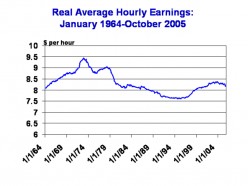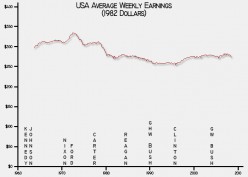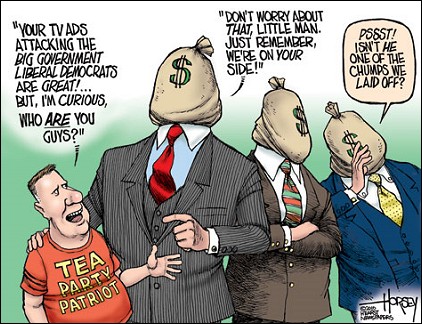Why we need unions and what it means for the US to not have them.
Wages have not been keeping up with the cost of living for a long time now in the US and the primary reason is the weakening of the unions, the problem really began during the presidency of Ronnie the union buster Reagan, unions began to lose ground against other movements and many were in fact destroyed, most people are aware that the economy was positive under Reagan (despite the tripling of the public debt) but that wealth did not in fact trickle down, under Reagan with the economy surging the number of people below the poverty line in the US grew and wages began to seriously lag behind cost of living for the actual working American. From 1980 to 1990 wages in constant 1982 dollars fell by 12.73% while the cost of living grew by more than 25% and that is a trend that has not been broken since (wages rose slightly under Clinton and have fallen ever since) and the cost of living continues to skyrocket.
Without the unions working people have absolutely no recourse for raising their own wages to just meet inflation or even to stop them from falling, one thing is for sure the private sector won't be raising wages of it's own accord, if Americans want their wages to rise for the people doing the work that keeps this country running then they need to remember the meaning of the world solidarity and remember that the unions are the only method that has ever improved the lot of the working class.
http://www.alternet.org/newsandviews/ar … _of_greed/
http://voices.yahoo.com/the-cost-living … 14969.html
http://www.workinglife.org/wiki/Wages+a … 64-2004%29If the private sector won't raise wages of its own accord, why are 99% of workers paid above the minimum wage?
Because 95% of all statistics are made up on the spot.
74 million hourly workers, representing 59.1 percent of all wage+salary workers.
125 million total wage+salary workers.
1.7 million paid exactly minimum wage.
1.7/125 = 1.36% of all workers make minimum wage.
Source: http://www.bls.gov/cps/minwage2011.htm
Sorry, I'll fix it.
Why are 98.64% of all workers paid above minimum wage?http://www.getrichslowly.org/blog/2007/ … imum-wage/
about 2.2% are paid minimum wage, about 20% are paid minimum wage +5% or less most businesses avoid paying precisely minimum wage and set it just above to avoid complaints. But without interference wages have been falling for decades so obviously they won't raise their wages also you are forgetting to point out that many of those wages will have been raised by unions. So your whole statement is baseless.1.36%. I provided up-to-date numbers from 2011 from BLS.
Where did you get 20%?
Most of your statements end up being completely baseless, mine are sourced. Wages have increased over the years, as have benefits. You need to include benefits in earnings.
http://mjperry.blogspot.com/2006/11/rea … eased.htmlhttp://www.bls.gov/cps/minwage2009.htm
According to that (being the actual BLS site) upwards of 5% of people are paid at or less than the minimum wage.
Josak, most of those lower paying jobs are entry level, part-time jobs...moving up to hire paying positions requires hard work, paying your dues (work and time, not fees to a union)...or start your own business.
How is 5% or even 10% of the workforce a dilema?
I agree! Without unions, we would go back to slave wages and employer abuse and intimidation.
Unions are not needed when and IF there's a level Economic playing field.
Unions would not be needed IF people were better educated with the most critical life knowledge.
Unions would not be needed because it's one of the causes of the increases in the pricing structure of America's Economy.
The Standard of Living, as I have written about is a two-fold perception of the individual. One has to do with Economic details and the other has to do with one's own actions.Without unions we are drifting back into 19th century conditions where child labor is an option as well as the 12 hour or more day along with a seven day work week. This is all going on right now in Asian countries. In addition, to compete with Asia, the west is adopting private for profit prisons where manufacturing is being done at competitive "wages" of the Asians who are getting about 20 cents an hour. Based on recent figures in Canada for similar times and employee wages in prison, the prisoner makes about 30 to 40 cents an hour. What this means is that non unionized jobs are being eliminated for competitive prison labor. Now, one may say that 30 cents an hour is higher than 20 cents an hour, but consider that the product like your I-phone of I-pad has to be shipped over sea and that adds cost. To cut back on these, local prison labor can cut costs significantly even though it costs anywhere from 55 to 14o grand to house a prisoner. But to run a regular factory with dorms costs just as much. Running machinery and tools costs money no matter how workers are housed.
Now, to the second point. Union struggles for higher wages has always been blamed for inflation when the real cause is other than that, primarily, financial manipulation of the economy through high interest loans. This is an important point because, what it means that whenever the unionized worker gets a pay raise, the landlord raises the rent by more than the wage gain and the prices go up. Prices going up occur regardless of whether you get a wage increase in a union shop or non in a non union shop. The solution to this mess has to be far more fundamental than this and strike at the root of the whole corrupt system.
The IWW (Industrial Workers of the World) proposed one big world wide union. This is not so. We have headed in the opposite direction. Very few workers are unionized today due to the policies of Thatcher, Reagan, Mulroney, Campbell et al. They also had the assistance of corrupt union heads. I recall a scene in the fall-winter of 2008 where the union head of GM whimpered to the CEO of GM to give the laid off workers their severance pay as the means of production were being hauled out of the plant without so much as an information picket line. This was the most pathetic sight of "union struggle" that I ever had the misfortune ever to witness in the sum of my life!
There is no doubt that we need some very serious attention to this matter and we had better get a bloody horrible grip on ourselves before it is too late!unions are not needed i'm sorry to say. paying higher wages, more benefits to people who do mostly unskilled labor like in the automotive industry is way out of hand. what is needed is for people to stand up for themselves . unions cause companies to pay more which in turn causes companies to charge more for their products. my company, though small is ran on a profit sharing policy and my employees make more then union guys do but that is only because they know that by working hard and dependably, their wages go up. i pay my laborers $12 an hour to start but after the first year, they become part of the company and with profit sharing they average about $22 an hour. my electrician quit a union company to work for me and he will make an easy $85,000.00 this year.this need to have a big daddy watching out for the employees is rediculous and it's killing the U.S. and Canadian market. the only good i've seen from unions is they save the lazy peoples jobs.i live in a union town and a lot of people here are getting sick of watching people who don't deserve their jobs get paid an absurd amount of money to do nothing.
another thing is that because we work profit sharing we use 2 people to do a 2 person job, not 4 like a union company would end up doing. we each make sure that everyone is doing their job because if one person gets lazy, we all lose money and that isn't fair.
Unions are a necessary evil but we need them to protect the employee. Yes, unions do have a tendency to protect the worst employee. I have seen this many times. Unions protect the worst worker while oftentimes leaving better workers out to dry so to speak! It is because of unions that it is hard for employers to terminate bad employees. For example, it is extremely difficult for a bad employee to get terminated. Even employees who physically attack their coworkers and/or boss cannot be terminated. I remember a high level supervisor stating that he cannot terminate an employee who had a history of insubordination because of the union. While union do good things, they are mostly evil!
In the UK no union would protect an employee guilty of using violence.
How many US companies profit share with their workers?
And how many profit share outside the company and the workers?
Unions are needed in order to keep the checks and balances in Capitalism. If they are not there, then eventually, a few people land up with all the wealth and everybody else starves.
This is the result of any aspect of competition. Only a few win.
http://capitalismandyou.blogspot.com/20 … -well.htmlDeleted
But higher wages mean increased purchasing power!
Increased purchasing power leads to a stronger economy.
Henry Ford wasn't it, who wanted all his employees to be able to afford Ford cars.When you artificially raise wages you in turn raise the cost of the goods and services produced by those worker...never ending cycle of raising wages and rising prices...I've written on the topic.
Every time I see this thread pop up on the first page, I read it as "Why we need Unicorns"
 The reality is not half as exciting as Unicorns....
The reality is not half as exciting as Unicorns....We need unicorns because they make their cousin the horse work harder to make up for horn-envy.
They also protect our fairy princesses and without fairy princesses all the magic and beauty in the world would shrivel up and die.
I don't know about you but I need beauty in magic in my life. There has been a lot less of it these days because we keep putting unicorn busters in office.
Did you know that unicorns are not even on the endangered species list? I know -- it shocked me as well. This is a startling fact and if we are to do anything about it we need to act now before it is too late. Even as we speak poachers, trolls and goblins are hunting and destroying the last of our unicorns. It is up to us to stop them.
Act now, because being silent about the issue is the same as condoning it.
Perhaps you were wondering why we need unions? Although I must admit that unions are wonderfully successful at bankrupting companies and governments. It is amazing though that relative to their size, in which unions represent approximately 5 percent of private sector America, have such an adverse impact on artificially raising wages, which in turn artificially raises the cost of goods for the other 95 percent of Americans.
Why? That's backwards thinking imo!
Why not cut ceo salary instead of raise cost?
Why blame the workers? Because they want a share of the pie they bake?
You shouldn't BE in business if you're not going to provide well for your workers.
Non sense that Unions cause costs to rise....owner and ceo greed do.
DO NOT tell me you NEED to raise prices when your CEO makes 9.6 mil a year (average pay of ceo's)
And don't tell me taxes are too high, when they have 250 mil to throw around to elect Romney.The 250 million is peanuts compared what obama is raking in. Yeah, a lot of it is from the poor union worker who pays outrageous dues so they can be sent to obama so he can cut more jobs and raise the union workers taxes. How much are the movie stars making off the backs of poor people, only to give it to obama?
That's not what I hear....where are you getting your info?
Romney has big business, oil, nra and wall street...not much can match that. AND he has media!
No one ever questions Mitt's lies! except msnbc.Logicandcommonsense, your comment makes no sense whatsoever, common or otherwise.
Try to get your facts straight. Obama saved a million jobs in the U.S. auto industry. The UAW contributed to the success by agreeing to a big haircut on wages and benefits.
(BTW the bailout was proposed and supported by Bush.)
New thinking is required. The unions cannot keep asking for more and more pay for doing the same work. The union leaders and their members don't want to face the reality. In fact, I think that the leaders know better but are afraid to speak the truth to their members.
They are not asking for more and more, they are not keeping up with inflation or the cost of living , they are receiving less and less.
If the starting rate of pay is too high, then asking for a cost of living increase will create a huge problem. Auto workers for example were grossly overpaid and GM had to be bailed out by taxpayers, many of whom were not making anything near to what the unionized auto workers were.
Haha, seriously?
How many times do I have to show you government statistics that prove wages are increasing more than inflation?I showed you my figures and told you why I thought your figures were incorrect, I still do, as does every economist I have spoken to about the issue. You did not prove anything at all, your statistics were limited to a small time frame limited to a certain group of people and most importantly compared against themselves making them irrelevant. The following is the Department of Labor graph on real wages which covers 64 to 2005 that is just accounting for inflation so when rising cost of living is taken into account you can see how badly the average wage is falling, those are the statistics of the department in charge of these matters. I have nothing further to say on the matter and the evidence is irrefutable. As for after the graph ends things have gotten even worse with the recession.
You do not prove anything you just muddy the waters with irrelevant statistics.
1 - Please can you provide a source?
2 - I showed you CENSUS figures for ALL INCOME BRACKETS adjusted for inflation. Everyone else posts to web articles.
I believe you once posted a BLS page as a source, and that same page said that the BLS doesn't provided detailed wage information as that is handled by the CENSUS.
But, just continue to ignore the primary sources.
3 - You tend to only look at hourly wages. You don't look at salaries or total compensation(which includes benefits). I've provided the figures that do look at total compensation.And, FYI, the Department of Labor gets its information from BLS and CENSUS for those statistics.
Here's another BSL report:
"In 2003, the lower limit of the 10th earnings decile
was 27 percent higher, after adjusting for consumer price inflation, than it was in 1979."
http://www.bls.gov/opub/mlr/2005/05/art1full.pdfJaxson, you are conveniently forgetting this post that I made earlier;-
"The median household income in 1989 in current dollars is $28,906. If you compared that with the 1990 median household income of $29,943, there appears to be an increase. If you adjusted that 1989 income for changes in the cost of living (converted it to 1990 constant or real dollars), the resulting 1989 median household income is $30,468 (now a 1989-to-1990 comparison of income shows a decline of 1.7 percent)."
http://www.census.gov/hhes/www/income/d … llars.htmlI have addressed that post twice John. I never said the median household income increased every single year. I said that the median household income has been steadily increasing.
If, over the course of 30 years, and being adjusted for inflation, the median household income has risen 27%, then what is the long-term trend? Sure, some years it went down. Some years it went up by 5%. That's why looking at one year is beyond ridiculous.But adjusted by who? The census people obviously don't adjust, so who does?
Your worship of wealth seems to blind you to the obvious and the obvious is that everybody but you is saying that in terms of buying power wages are falling.What are you talking about? The Census people apply inflation adjustments. They did it in your example. They did it in the reports I linked to.
I'm saying that total compensation isn't falling, and I'm backed by government studies. You just used the census as a source, and the Census itself says real compensation has increased, as have real wages.
The BLS has also said that real wages have increased.
But, you won't believe the BLS or the Census bureau if I post their reports.
Unions may have made some contribution to the early working conditions of workers along with increased wages. Over time though, that has been the reputation that they sold themselves on time and again. The song has become old and monotonous. The American workforce is actually in the process of shrinking with the advent of retirement of the baby boomer generations and most viable companies recognize that direction. That is the basis for the emphasis on diversity appreciation which is running like a virus through US corporations. More acceptance of the international worker...a more harmonious multi-ethnic workplace being the goal. The rest of the world has no appreciation of that and ignores it in their culture. One only need to look at what happen to the union workers who elected to strike Eastern Airlines or Overnite to see the damage unions can reek. American Airlines faces a similar fate and it is exactly the straw that broke the back of GM requiring it to be rescued by the federal government. It is basically the same thing that is going on with our government today...false promises which no one cannot afford are made and the can is kicked down the road until there is no longer a place to kick it. The American labor force, thanks to union assistance, has priced itself out of the global manpower market. At the same time, you can also thank the liberal efforts of Bill Clinton for throwing NAFTA into the mix opening the doors for manufacturing bases to move away. Any corporation in the world will tell you that America is the most expensive market on earth for labor costs and the products which emerge from that production are generally not saleable in many of the other markets of the world. Investors and business people take risks and invest money for one reason...to make a profit and to show a dividend (ROI) for their investors. There are no missions in place to promote the public welfare in corporate mission statements....most will go broke when they pursue that focus and ignore the competition in the market. Apparently, you must think that a private sector controlled by the government and ruled by the unions would be a wonderful way to gain equality and fairness in the country. In effect, it will do little more than drive down productivity in the end. With such a result, companies will fail and all the jobs will be lost...when wins there? WB
Wayne you hit the nail on the head. Unions are no longer needed and have priced our selves out of work. The only persons who are making out with unions are the union bosses. The employees pay them.
I would not exactly refer to Ronald Reagan as a "union-buster" in that the air traffic controllers union (PATCO) was working under government guidelines and restricted by law from striking. Reagan warned the union as to what he would do in light of the work slowdowns and the 2,000 controller sick-out which had already occurred. Reagan considered the matter as a significant threat to the public safety when the union did launch the strike in violation of the law. On that basis, he fired them, which was a rather bold move on his part, but, a necessary one. I am sure there must be some former air traffic controllers out there who look back and wonder how their career might have gone had they not elected to follow a union direction and strike. Here again....another outcome that benefits no one driven by a union. WB
Union buster was a tile that was often given to him in the media both in compliment and in criticism, I think it's manifestly unfair to look back at an event when thousands of people lost their jobs asking for very reasonable pay hikes that would have matched inflation and say gee unions are bad, rather I think it's more accurate to look back and wince and say wow we really screwed our working people didn't we? According to an economist's review I was reading about a week ago (I will try to find the link) the firing and rehiring process and the whole wrangling cost the government enough to pay for that raise for 15 years.
Reminds me of the UK miners strike. The cost of breaking that one took up twenty years of support for the mines!
We don't need all unions. Especially those that are controlled by organized crime.
Agreed. It is unfortunate that some unions (actually a small number) have gone that way but all organizations can be corrupted, we should try and fix the corruption, but unions are nonetheless necessary.
...a small number...??? but isn't it the largest ones that have the greatest abuse of corruption and monopoly of members and use of their dues
Which ones are those? The Teamsters have cleaned up their act. Some of the unions in New Jersey and NYC have mob connections. Most are pretty clean.
- JaxsonRaineposted 13 years ago
0
Besides, if you are angry at the cost of living going up, get angry with the government, both sides of the aisle, destroying the dollar by running ridiculous deficits every year.
I am, but this is a separate issue that wages have been going down.
Wages have been going up.
When you factor in cost of living increase, which is partly fueled by the national debt, then they haven't gone up as much, but they have still gone up more than you are saying.Separate from cost of living, just dealing with currency inflation wages have been going down, one of the links I posted in the original post shows it in 1982 constant currency.
We need to remember that devaluation of the dollar caused by the government freely printing it and increased costs in transportation of goods are pulling at both ends...deflated dollar value and inflated prices. Certainly the worker does not benefit in that scenario but neither does the corporation. The media reports that profits are up but that number may simply be a dollar with no real measure of the worth of those earnings against a baseline. In effect the corporation also needs a nigher profit to come up with the same dollars. So, not only does the employee have a dilemma...so does his company. It all circulates back to a poor environment in terms of the government dabbling to much in the economy and over-spending in the process. Big government eventually leads to high deficits, large debts, over-regulation, and a private sector which gets crushed in the process of government shoving it around to be the center of the universe. Our problems today trace right back to the government. Some may think Obama tossing 800+ billion dollars into a black hole helped save us but I beg to differ. Most of that money never saw the mainstream and in the end it only increased the debt load and further devalued the dollar. Government has no place in the operation aspect of the economy except as a responsible party in helping to nurture those conditions under which the private sector can flourish. WB
Very good reply. We only need unions and government to a point.
Here's a better one . . . http://youtu.be/6yrT-0Xbrn4
- Will Apseposted 13 years ago
0
The US has had enough of a dose of strong unions and still has enough strong unions to mean a high wage economy.
Take a look at the economies in countries with no history of trade unions to see how bad things can be without them.
SE Asia provides the classic examples. Very low wages and most workers in the multinationals cannot afford the goods they produce.
You get nothing for nothing and hanging around for employers to suddenly get generous will get you nowhere.If you are a good employee and don't miss work and do your job then the rewards are there. If not then go find another job if you think the one you have does not..
Well that is complete bull. Firstly we are in an economy where finding another job is a nightmare.
#2 Unions do a lot more than protect people from unfair dismissal for example unions make sure people get paid at least minimum wage and represent workers if they are injured, way back I had my arm crushed in a mining accident caused by the company not using equipment of the right duty (it's maximum safe load was about 1/2 of what they were using it to lift. The company leaned on the people who were in charge of replacing the straps and told them they would be let go if they testified that the wrong equipment was being used, I would have been unable to work for years with no help whatsoever if the union had not helped me, I probably would have lost my home etc. if not for the UMWA.
#3 Unions represent workers in pay disputes which obviously is necessary due to falling wages.
#4 Working people are the most important group in the USA without them the whole thing goes to c**p every measure should be taken to protect them.
#5 Those Federal and state laws that "protect workers" are completely useless without union support because most employees do not have the resources to take on their employer in court and prove it.
Unions should not be protecting bad workers but they are absolutely necessary for the above listed reasons.
back when they started with unions the working conditions were horrible. The Unions were did a lot to get better working conditions. Now with the State and federal government passage many work and labor laws. Here is one thing I think the government has done good on. All the unions do now a days is protect employees that should not be working. Also the high wages that some unions have gotten for there employees has driven business out of this country or closed them.Take for instance the Steel Mills in Pittsburgh. Unions ruined those jobs.
We could argue all day long on this point,but I have worked in several shops where there have been unions and some employee always come in late or miss Mondays and the union protects them. Where if you are a good employee never miss work and you have to make up for the one who misses. The company try's to fire them and they can't cause of the union. or they come in buzzed from lunch time and same thing. Unions stink. Then every pay there come out union Dues. If you are a good employee then you don't need a union. All they do now a days is take money out of your wages and have no other benefit.+1 That has been my view for a long time now - at one time unions were a great thing and benefitted the country considerably.
Currently, however, they are a drag on the economy, producing only inflation and VIP "non workers" to watch over and control union members.Why do people think theses jobs are leaving this country? The company's can get it made with less labor cost else where. The Public Employee's union are the worst. People complain because of taxes going up and don't realize that the public union employee are making a killing. With wages and benefits that are way beyond what normal worker are getting.
We cannot possibly compete with the low wages in China, the average wage in China is just over 5000$ yearly. It is not unions that make us not be able to compete with Chinese wages it is macro economics.
http://www.worldsalaries.org/china.shtmlSure and there cost of living is lower to. No unions to drive up prices.
Ok firstly China has serious poverty issues 36% of Chinese people live on less than 2$ a day, Workers are regularly not paid, poverty is common and people work ridiculous hours and as a consequence often destroy their bodies, they also have nothing resembling pensions (care is left to the children), job security or workplace safety. China desperately needs Unions.
More importantly as an economist I can tell you very easily that China's economic success has nothing to do with no unions and all to do with: successful planned economy, the Chinese government artificially (and illegally) keeping the currency at a low value to prevent inflation and to help with international trade, Chinese success also depends on the complete exploitation of the employee.
Also even public Union wages are not keeping up with inflation and cost of living (not even close).
They make a lot more then we do.There benefits are for the most part paid for alone. We the tax payers are not keeping up with inflation. They are ONE of the causes for inflation.
I agree they get more than is fair but even they are not keeping up with the rising cost of living. I also forgot to mention earlier:
#6 Unions have a stronger connection to the worker than congress ever could so the Unions are in the best possible position to understand what protections and workplace safety laws the worker needs and wants and push for these to become legislation.
They are making a heck of a lot more then most people. There benefit packages alone for the most part have no co-payment's.
The fact that they are making much more and still not keeping up with cost of living and inflation is a perfect illustration of how bad the situation is.
Yea well how about the tax payers who pay the public employees wages 1. Make less 2. Our cost of living goes up to.3. we are suppose to pay them more then we make and they complain about there cost of living.
Don't public employees in the States pay taxes then?
Of course but not anywhere near what everybody else has to pay. Because of there benefits and wages. What they pay is a really small percentage of what is actually paid. What maybe a couple percent?
What, so public employees pay a couple of percent! I don't believe you.
Well if you take the whole population of working people in a state or the country and figure out what they pay in taxes per working person then then yes they pay a couple per cent. Although Obama thinks that when people who get hired work for the public employee then you actually created a job. but what happened is it now cost tax payers more. Again how many time's have you drove down the high way and saw local government employee's leaning on shovels.
And they'd be better for the economy sitting on doorsteps getting drunk (at the taxpayers expense).
1) There is never a level economic playing field.
2) Define what you consider to be 'critical life knowledge'. Wouldn't that be: You can't breathe under water w/o the proper equipment?
While I agree that unions contributed to higher prices, it is the minimum wage which pushes costs across the board, higher yet. Watch the grocery store within a week of a minimum wage increase. Oil also pushes costs higher. Noticed the pump lately?
Before the unions: Children the age of twelve were working in coal mines. Unions helped to end that...but it wasn't because of altruism. The working day was twelve sometimes more hours per day with no or few breaks. No sick days, no vacation time, no overtime and no real pay raise structure. Legislation by the U.S. gov changed alot of that, but, there are still instances where unionizing can be, and is beneficial. I might agree that the need for unions has changed drastically from the twenties and thirties, but remove them and you will see a slide back into old ways where ever possible.I would phrase that differently and say that ensuring that everybody had at least a minimum standard of living contributed to higher prices, but also meant that there was more money in the general economy.
Please do you really believe that if all unions were abolished right now that things would start to slip. The only thing that unions are good for is taking your money every pay and protecting the people who are poor workers and other people have to do there work for them. Why do you think we lost a lot of Steel industries in the Pittsburgh area. Unions. There protection of dead beat employee's and the too High wages. The Auto industry also has had the same problems. What happens to our Steel mills. The got sold and shipped to other country's where the labor prices are better. Unions are worthless. the only people who make out are the Union Officers. Go on strike and see what ya get. Your Union Officers don't hurt do they?
Yes.
You only have to look to the UK where Thatcher virtually abolished unions to see what would happen. We do have a minimum wage but it's only the few remaining unions that keep that in place. When the unions are finally gone, the minimum wage will go too.My biggest complaint is the public sector unions. Teachers, Bus Drivers,
State workers. Those that work for the Tax Payers. Federal Workers to name a few. they are the ones with wages that are way out of control.What is the average wage amongst the groups you mention?
teachers are making 45,000 to 60,000 a year and work 9 months out of the year. Also every holiday you can think of off plus 2 week for Christmas.State workers $20. to 35. an hour plus time and half on over time. When it snows plowing roads. Plus full benefits no co pay.
Turnpike employees (toll road) start at 21.00 an hour for sitting taking tolls full benefits. Notice i said start at. Every year the have been raising the rate. .30 or .40 cent an exit. I used to travel 2 exits cost .75 cents now 2.25. in 10 years time.
That's very low for a teacher. No wonder the American education system is second rate, you pay peanuts, you get monkeys!
In New York State, federal and city civil service workers are paid more than similarly situated workers who work for New York State Civil Service. State civil service employees are the lowest paid of all civil service workers in New York State. In federal employment, in the 2010, a GS-7 employee earns at the entry level, $33,979, gradually advancing to $44, 176 while a New York State civil service employee at a similar level earns at entry level about $29,000.00.
But I was looking more for comparisons with workers in the private sector.
Average wage for people above age 25 in full time work in the US is 39,509, (with US stats always remember that we have a massive pay imbalance at the top) Average wage for person over 25 with a college degree (I believe teachers need college degrees right?) is 56,027 and remembering that many college degrees are much easier and less useful than a teachers degree it does not seem like teachers are being paid very well at all. (I don't get what he is complaining about)
No, teachers in the UK get more in GBP than American teachers get in dollars. £65,000 is about $100,000! And I'd say that UK teachers were being underpaid!
On the contrary that is where our wages should be, actually higher, to keep up with inflation and the rising cost of living, that is not happening which is why we have so many working poor in the USA (15.1% of Americans live below the international World Bank poverty line) So as is clear we should not be worrying about how much public employees are being paid and trying to change it (especially teachers) we should concerned about how little private sector employees are paid and how we can fix it.
The reason that public sector workers are paid more is because the government is a slightly more compassionate employer who makes some effort to keep up with the economic realities, despite this even in the public sector their wages are worth less and less every year.
Wages are already to low and as I wrote Unions are responsible for much much more than just what you mention:
#2 Unions do a lot more than protect people from unfair dismissal for example unions make sure people get paid at least minimum wage and represent workers if they are injured, way back I had my arm crushed in a mining accident caused by the company not using equipment of the right duty (it's maximum safe load was about 1/2 of what they were using it to lift. The company leaned on the people who were in charge of replacing the straps and told them they would be let go if they testified that the wrong equipment was being used, I would have been unable to work for years with no help whatsoever if the union had not helped me, I probably would have lost my home etc. if not for the UMWA.
#3 Unions represent workers in pay disputes which obviously is necessary due to falling wages.
#4 Working people are the most important group in the USA without them the whole thing goes to c**p every measure should be taken to protect them.
#5 Those Federal and state laws that "protect workers" are completely useless without union support because most employees do not have the resources to take on their employer in court and prove it.
Unions should not be protecting bad workers but they are absolutely necessary for the above listed reasons.In some jobs, not all jobs.
Secondly, the problem isn't the wages, except in some areas. The problem is the pricing of products, which are no longer made here, but imported in from other countries.
All the taxes companies are suppose to pay for bringing their product to market is passed along to the consumer every single time.
Made in America used to mean value. Now it's a pathetic joke.when you say THE problem I disagree, A problem I am totally with you but wages definitely are a problem, it used to be that a person could work full time at a blue collar job and provide a decent life for their family, not so anymore. That is a big problem wages are not even keeping up with inflation, they lost 12.7% (if I remember correctly) of their value in the 80s and have never recovered from it but continued to drop at a slower rate and that is jut compared to inflation.
This is exactly what I am talking about. The pricing structure is based on the U.S. dollar and it is also based on profit margin, as well as profit margin growth percentage.
A decent life? Who is to define this? My hub on Quality of Life vs Standard of Living makes the thought of a "decent life" completely meaningless when properly understood.
Yes, but inflation is due to the faulty work done by government to handle the Economy, while it continues to print more money devaluing the dollar, which is precisely why prices went upward.Prices going upwards are separate from inflation in terms of cost of living.
A decent life is pretty self explanatory. People used to call it the American dream, a house, a car, money enough for retirement and to put the kids through college if they want to do it.The only thing the government doesn't account for when you talk about "cost of living" is gas and food. These are not part of the equation. All OTHER prices are.
No it's not. A "decent life" is no different than someone who talks about "quality of life".
Yes, and what's your point. That still exists and it is up for anyone who has the ability to do so.
The problem is getting a level playing field when it comes to either working a job or running a business.
The economic playing field is all screwed up and if the government isn't careful, which we all know they are never careful nor do they think about the intended consequences(if they did think about it and then it would only prove corruption of the highest level, with continued action), then there's going to be even a bigger problem down the line.A decent life, just like Mom and Dad had? As a child, we were straight middle class. Happy, with all we needed.
A home half the size of what is "necessary" today, and with one bathroom. One car, with a radio and heater. No power mirrors, no power seats, no fancy "fold down into the floor" seats, no TV for the kids in back, no AC. No satellite TV and no cable. One house phone, no $100+ per month cell plan. No internet fees. No movie channels to pay for. No RV, boat and dirt bike in the garage. A retirement account didn't have to have enough in it to travel the world each year. No $100 designer jeans or shoes.
The list could go on forever, yet we were happy. Parents at home with us, a nice vacation (Disneyworld, maybe, or a trip to the beach) each year. Kids were active, healthy and happy with their lot in life. We didn't have, or require, Ritalin each day just to get through the day - a bicycle served instead. We worked our way through college rather than taking out loans or asking someone else to foot the bill so we could play our way through those 4 years.
Is it just possible that the required necessities for that "decent life" have increased just a wee bit? Take out the luxuries that were unheard of a few decades ago and even minimum wage is livable for a single person with a roomie or two. The biggest change isn't that we don't earn as much - it's that we demand far more luxury than we used to but want it for the same (inflation adjusted) income.Maybe the notion has changed in the public eye but not the standard I am using, the life you described growing up is more than adequate, people can live with relative security and dignity but that is not the reality of most families in the US. 15.1 percent of Americans live below the international poverty line according to the World Bank, that means they can't afford regular housing and/or food let alone own a house and a car and people can no longer get by in the lifestyle we discussed with one full time job in the family.
- Will Apseposted 13 years ago
0
In social democratic countries like Germany that have very strong unions their involvement in the economy goes way beyond wage bargaining. They are as concerned as employers to keep industry strong.
There is agreement across the social spectrum that maintaining employment in Germany is far more important than a company having the ability to make a few per cent extra in profits by outsourcing. If that consensus ever brough down unions have the power to bring things back in line.
Unions also lobby for more training, more infra structure spending and promote industry as hard as employers groups.
One of the most notable things in Germany is how much respect workers expect and get. A carpenter will often where a suit on his way to work! He will expect lockers and showers on site so he can wash and wear his suit on the way home.
This is why Germany will always outperform right wing countries like the UK. Only the huge natural resources and vast internal market of the US allows it stay rich in the face of suicidal economic choices. And that might not last.+1
If we don't treat the people who actually produce the wealth of a nation with respect then who should we respect? and if an employee gets no respect why should he respect the company and do his job to the best of his ability? German workers are ranked as the most efficient in Europe and one of the best in the world, I don't think that it's unrelated.German workers are ~63% as productive as US workers.
http://kilm.ilo.org/2011/download/kilm17EN.pdf - Figure 17a
Just sayin'This actual just proves the point of this forum post, the effectiveness is measured against pay parity of production, because pay parity in the US is so low the US worker produces a lot against what he is paid. But that is not the efficiency I was talking about.
Actually, things are more expensive with PPP in Germany than in the US. 13% more expensive.
http://en.wikipedia.org/wiki/Purchasing … ice_levels
US workers get paid more than German workers. They produce more wealth than German workers. The money they are paid buys more than the money German workers are paid.You compare the United States with one European state, wouldn't it be better to compare with the European Union?
The specific topic was efficiency of workers in Germany vs. US.
Josak claimed that while US workers might be paid more, the money isn't really worth as much.
But we can compare other countries. (more = more money to buy the same products)
Austria - 17% more
Belgium - 23% more
Denmark - 58% more
Finland - 33% more
France - 21% more
Greece - 5% more
Iceland - 18% more
Ireland - 32% more
Italy - 4% more
UK - 33% moreBut that list doesn't mention Germany at all!
I already mentioned Germany! I said 13% more in that previous post, and you complained that I didn't mention other countries.
[sarcastic font]So sorry that I didn't re-include the data you were complaining about in the list you requested of other countries.[/sarcastic font]
Seriously, are you just trying to be obtuse?I said nothing about "other countries" I expressly stated the EU.
There is no such thing as PPP for the EU. It's different in each country. So, I posted a list of other EU countries for comparison. I was right, you are just being obtuse.
The same money gets you more stuff in the US than the EU.
Do you expect me to gather the info for each EU member state, then weight each number by population, then average them?
Isn't it enough to show that PPP is higher in individual countries?No, the first figure in the tables you posted was for the EU.
What are you talking about?
http://en.wikipedia.org/wiki/Purchasing … ice_levels
These are by country, nothing for the EU.I'm talking about the first link that you posted, not later ones.
What link?
I posted a link showing that money in the US gets you more than the same money in Germany. You said I should compare to the EU not just Germany. I then compared to other members of the EU, and you complained that I didn't include Germany in the list again. I pointed out that I already gave Germany's data, then you complained that I didn't just give you the whole EU. You then claimed that my own link had data for the EU, and I pointed out that it didn't.
Now you are saying that it's a different link that I posted earlier that has nothing to do with PPP?
What are you talking about? Seriously, you have got to be trolling at this point.
I see this whole study that you are qouting is making the same mistake, calculating worker productivity as pertaining to GDP, there are a multitude of factors that determine how productive a laborer is, they include the quality of the machinery he may be working with, the quality of the materials, the efficiency of the plant setup, all the way to simply how fertile farm land is a person with poor land for example can work much harder and get less product than someone who does hardly any work on very good land, this measure is completely unreliable as a measure of how hard an employee might be working (which was the point of this line of discussion) so all this "evidence" is pointless.
No. That list is a list comparing Purchasing Price Parity. It has nothing to do with GDP OR productivity.
You have basically ignored every point I have made.You are still using this link right?: http://kilm.ilo.org/2011/download/kilm17EN.pdf
"Productivity represents the amount of output per unit of input. In this chapter, output is measured as gross domestic product (GDP), which represents the compensation for input of services from capital"
if you are no longer using that link could you post the one you are using, all info from that link is useless due to the GDP issue as addressed earlier.You quoted a post about Purchasing Power Parity, which I had linked to earlier. That's not what I was talking about.
In the KILM link, we are talking about GDP per capita. GDP is the value of all goods and services produced by a country. If you divide that by the workforce, you get the value of all goods and services produced per worker.
The US produces much more value per worker than other countries.And I have already addressed why that is pointless above.
To reiterate:
I see this whole study that you are quoting is making the same mistake, calculating worker productivity as pertaining to GDP, there are a multitude of factors that determine how productive a laborer is, they include the quality of the machinery he may be working with, the quality of the materials, the efficiency of the plant setup, all the way to simply how fertile farm land is a person with poor land for example can work much harder and get less product than someone who does hardly any work on very good land, this measure is completely unreliable as a measure of how hard an employee might be working (which was the point of this line of discussion) so all this "evidence" is pointless.No, it's not pointless.
You claimed that German's workers were the most efficient, with no proof to your claim. I showed that German workers don't produce as much wealth as US workers.
You can blamed materials or working conditions or anything else, but if you want to tout Germany as the union-makes-it-all-better example, then you have to face the fact that German workers don't make as much as US workers, and they don't produce as much as US workers.
I reckon they are at least 63 per cent more productive than I am. When hung over that figure rises.
One of the most important but often overlooked functions of unions is to provide a private industrial jurisprudence system terminating in impartial arbitration. This provides a measure of protection to workers against unfair, arbitrary management actions. These grievance procedures require that good cause for discipline and dismissal must be proved by employers. Collective bargaining also provides a voice for workers in the terms and conditions of their employment--paid holidays and vacations, extra pay for overtime work, health care, pensions (now disappearing), life insurance, health and safety rules and so forth.
Then why are we wasting millions of dollars every year on the US Department of Labor? What do they do if Unions are doing it all?
Unions were useful in our history once, but now they are just greedy bloated overheads that have done nothing but drive the cost of consumer products up and driven business to search for labor elsewhere to keep prices competitive.
The problem with unions is not the wages paid, it’s the perks demanded.
Here is an example. I have a friend that worked for GM and was part of the UAW. He worked for the company for 12 years driving a forklift. He reached the mandatory retirement age and of course retired. He collects from GM (Not the Union) a 2/3 wage pension every month with full medical benefits (also provided by GM, not the Union) and has been doing so for the past 22 years. Oddly enough, with union cost of living increases he now receives more money in pension than he ever earned while working.
Wonder why that Chevy cost so much? Because of the union, one worker actually on the line has dozens of “shadow” workers behind him all still being paid for the one job one worker is doing.There is some truth in what you said. However, you don't have all your facts straight. 1. There have been no cost of living adjustments in your friend's pension. (Social Security is adjusted every year.) 2. If your friend only worked for 12 years his pension does not equal 2/3 of his wage at retirement. 3. The health insurance benefits are now provided by a fund administered by the UAW, not GM. How long they will continue at the current level is anybody's guess. It is true that legacy health care and pension benefits which the Japanese and other transplant companies didn't have helped sink GM, Ford and Chrysler's ship. There were a number of other factors as well, such as too many models and acquisitions (Jaguar, Volvo, Hummer, Saab), uncompetitive captive parts plants (especially in the case of GM), lack of attention to quality, counter-productive work rules and practices agreed to by management with the UAW, too many local plant strikes. Bottom line, it's fair to criticize the UAW for contributing to the decline of GM, Ford and Chrysler, but it's only one of a number of factors.
Geez Ralph, I’m not quite sure how you know I don’t have my facts straight. I guess you must know my friend’s business better than he does.
I wrote here exactly what my friend has told me in more than one discussion throughout our 20 year friendship. He often jokes that he has made more money retired than he ever did working. I’m sure he doesn’t know what he is talking about either, however he does go laughing to the bank every month to cash the checks (I’ve seen the checks).
Further cost of living adjustments are not purely paid based on the actions of social security administration. The private sector can do as it pleases, and in the case of companies dealing with unions must perform as contractually obligated.
Everything else in your supposition about the decline of the auto industry, with the exception of the acquisitions, is a direct result of union avarice.One reason is that I'm also a retiree from GM 18 years ago,and my pension is the same as the day I retired. Second, I worked 34 years in GM's corporate labor relations department, and participated in the negotiation of 11 national agreements between GM and the UAW. Take my word for it, GM pensions never had an automatic COLA adjustments. In the 1950s and 1960s they were adjusted (increased) on an ad hoc basis occasionally as a part of the economic settlement. Several years ago defined benefit pension coverage was discontinued. Employees now only get 401k plans.
Why do we have a labor department? Because it is necessary as an intermediary between unions and the legislature just as the unions are a necessary intermediary between the workers and the Labor department, obviously the labor department is not doing enough for workers because wages continue to fall in every way, in 2010 wages fell by 2% in simple monetary terms, take into account inflation (about 3%) and that is five percent fall in how much the average American earned in just one year, that's before even considering the rising cost of living. Obviously the rights of workers are not being properly represented or cared for by the Labor Department, if not the unions who do you propose should fix it?
Why does a Chevy cost so much? Simply it does not, a Chevy has never been as cheap compared to material cost as it is now because of better machinery etc. Why does it cost so much compared to a car made in say China? Because there are no pensions, health benefits, decent living wages, job security, pay guarantee etc in China is that how you want the American worker to be treated? Additionally China is artificially (and illegally) keeping it's currency at a low value and has had a lot of success with planned economy. That is why the Chevy is comparatively more expensive, it has nothing to do with unions outside of the fact that they are pushing for a wage that keeps up with inflation (and not getting it).
I just read a report that 75% of all chevy's are built in China now. I do not know if that is true but I would like to know because it makes everyones argument moot
Just curious, where did you read that report? It is true that GM is using the Chevy brand more in other countries, just as Ford uses the Ford brand around the world. But I'm pretty sure that 75% of the Chevys sold in the U.S. are made in China. In fact, I don't think that any Chevys are imported from China to the U.S.
Ralph,
I have to look for the article, I could not find it quickly, but here is the video that was attached to it. You can hear it from the horses mouth starting at the 45 second mark. Again, I am not sure how much of this is accurate.
http://www.youtube.com/watch_popup?v=Lvl5Gan69WoMore like from the horse's ass, Vince Wade, a Fox News reporter who has been ranting against the bailout of GM and Obama and China for some time and publishing character assassinations of the Kennedys and Hillary Clinton. However, some of the facts in the video are correct. GM was one of the earliest of the US and European companies to recognize the potential for car sales and production in China. GM has partnered with Chinese government-controlled companies to become the largest or one of the largest producers of cars in China. This has been a profitable venture for GM. There is nothing sinister about it, and the Chinese venture has not affected GM employment in the U.S. And none of the cars built in China are sold in the U.S. Profits from China are helping GM sustain its U.S. production and employment which has recovered considerably as a result of the bailout which began under George Bush and continued under Obama. GM has re-opened several plants and added shifts to others as a result of the bailout.
Not to doubt you Ralph, then why does the head of GM say in the tape about 75% of the US cars are from China?
Correction "I'm sure that 75% of the Chevys sold in the U.S. are NOT made in China. In fact, NO Chevys sold in the U.S. are made in China. Nearly all Chevys sold in the US are made in the US or Canada. A few trucks also come from Mexico. NONE come from China.
Oh also "oddly enough he receives more money from his pension than he did while working" (paraphrased) that is simply not true, this is not a complex concept, due to inflation and the cost of living rising money is worth less than it used to be so while his check might have a bigger number on it he is receiving less also as Ralph pointed out most of your statement is incorrect. Lastly do you not believe in pensions? How exactly do you want the elderly to get by?
- JaxsonRaineposted 13 years ago
0
Also, US is listed by the IMF as ranked 6th worldwide in income per capita.
http://en.wikipedia.org/wiki/List_of_countries_by_GDP_(PPP)_per_capita
I am actually tearing my hair out because you don't understand the difference between Gross Domestic Product and wages/income.... I can't continue to discuss these things with you if you do not know the very basics.
GDP per person is influenced by hundreds of factors, worker efficiency being a tiny fraction of that.Sorry, I was looking at the wrong link. That was part of the efficiency comparison.
http://en.wikipedia.org/wiki/List_of_co … nal_income
US actually ranks right at the top for earnings.
The information about productivity and efficiency still stands, and you haven't addressed it.
Germany is ~63% as productive as the US per worker, and Germany's PPP is 13% higher than the US.
- JaxsonRaineposted 13 years ago
0
Keep in mind the negative effects of unions.
For example, the Marion plant under Ampad. The Marion plant was acquired by Ampad, under Bain capital in July 1994. The plant was sold to Bain because it was losing money, and set to be closed if it couldn't be sold.
Ampad management attempted to negotiate with the union, but the union wouldn't agree to take a pay cut, so everybody lost their jobs.
A similar story happened at a typewriter manufacturing plant Bain acquired. The union wouldn't agree to a pay cut(in a dying industry), so everyone lost their jobs.
The United States Postal Service starts new part-time mail carriers at $19.50/hour, and runs $5 billion deficits per year. If USPS wasn't funded by the government, most USPS workers would end up losing their jobs. If you saw Maddow last night--she laid it out pretty square.
If the GOP can succeed in busting the unions, the Dems will have no counter to corporate money, and the GOP will effectively run this country with no opposition forever.
THAT is the real goal: Total domination. That is why Rick Scott has put 180,000 people off the voting rolls.
Why the GOP are making all these dumb new requiremnents to a citizen's right to vote.
They don't WANT dems or unions to have rights! They want Republicorp, USA.
Complete corporate control of everything, with them at the helm. And they have their corporate candidate now, too.
http://www.dailymotion.com/video/xr3j3v … ction_news
http://www.bing.com/videos/watch/video/ … nnjg?from=I remember when Thatcher was dismantling the UK unions, one employer pleading for them to be left alone.
His reasoning, he only employed about 350 workers but the act of having to negotiate with each and every one of them would make such inroads into his time that he would have little time for anything else.Agreed, I have a great relationship with the union rep at my company and he brings me any complaints or issues and I fix them as quickly as possible, this is a massive help particularity as far as the safe workplace conditions, the people on the shipping floor are the first to notice any safety hazards and the quicker I hear about them the quicker I can fix it which is great from an ethical standpoint but also probably saves me a lot of money in pay outs and lost time if someone got injured.
Used to be a time I would do the inspection myself but now the Union takes care of it and I can spend more time on Hub pages
Let's see, you retire, you immediately save on travel costs (gas, maintenance, etc) you no longer have to buy clothes specially for work, you no longer have to pay for your lunch and drinks throughout the day and lots of other bits and pieces.
Yes, working is an expensive business and I can see how somebody is better on two thirds of working income!- JaxsonRaineposted 13 years ago
0
Josak, try to keep up.
Let's review.
1 - Productivity of countries - Nobody in the OECD tops the US. This is the total value of all products and services produced in a country, per worker.
http://kilm.ilo.org/2011/download/kilm17EN.pdf
2 - Income per capita - US ranks first. All figures have been correlated according to PPP, so each dollar for each country is worth exactly the same in the table.
http://en.wikipedia.org/wiki/List_of_co … nal_income
3 - Money spent in the US will purchase more stuff than in almost any other developed country. This takes into factor exchange rates, so if $100 USD = $135 EUR, a person in the US will get more out of his $100 USD than a person in Germany who makes $135 EUR.
http://en.wikipedia.org/wiki/Purchasing … ice_levelsWhat are you actually truing to prove?
I've lost track, blame it on the unaccustomed sunshine if you like.The point of that information is that wages in the US are better than other countries, and that US workers are more productive, and that money earned in the US is more valuable than equivalent money earned in other developed countries.
Really, my point is what I posted in that post, it's pretty clear if you read it.
Josak is saying that we're getting screwed because of weakening unions, I'm just pointing out that we're doing better than most everyone else.But how are you doing compared with yourself 10 or 20 years ago?
That would seem more relevant than whether you are being screwed less than workers in other countries.
Ok so first one is useless as shown above.
Second one is very very old, I know for a fact that several countries have outperformed the US in that area a decade is forever in economic terms.
Third one shows that several countries actually have a better PPP but I am pleased that the US is in the top third.
However the OECD numbers from their site show that PPP is significantly better in the Eurozone than in the US.
http://stats.oecd.org/Index.aspx?DataSetCode=PPPGDP
None of this is addressing the issue of this forum which was the current trend as the power of the unions weaken which is that the situation is getting worse and worse for the working man.
On that note I shall have to go to bed it's 6:30 AM here in NZ and this jet lag is going to kill me otherwise.No, first is not useless. First shows unequivocally that US workers produce more wealth(half of the productivity equation).
Ok, provide some proof. You know for a fact, where is the data?
Notice the countries with higher PPP.
Turkey, Poland, Hungary, Mexico, Chile, Korea. Notice that more developed countries have higher PPP.
Higher PPP is worse. It means you have to spend more to get the same thing, taking into account exchange rates.
This addresses the point where you start talking about how other countries that are more unionized are doing better.
Good night.
This one
http://en.wikipedia.org/wiki/List_of_countries_by_GDP_(PPP)_per_capitaOk... that link doesn't have anything to do with comparing PPP by country, which is what we were talking about.
Why did you post it then?
Or, in other words, stop wasting my time
I posted it to another person in regards to another topic.
You are the one wasting time. Having fun trolling?
Let's review again, just for fun.
I posted a link showing that money in the US gets you more than the same money in Germany. You said I should compare to the EU not just Germany. I then compared to other members of the EU, and you complained that I didn't include Germany in the list again. I pointed out that I already gave Germany's data, then you complained that I didn't just give you the whole EU. I pointed out that there isn't PPP data for the EU, and you have to look at individual countries. You then claimed that my own link had data for the EU. I pointed out that it didn't. You then referenced a link that I posted earlier, in response to another person, about a different topic, and claimed that I'm wasting your time?
I don't know where you got that statistic. Do you have the report's source link?
I have these:
http://en.wikipedia.org/wiki/List_of_Ge … _factories
http://careers.gm.com/careers-worldwide … china.html
http://media.gm.com/content/media/cn/en … 09231.html
This is interesting:
http://factsanddetails.com/china.php?it … ubcatid=62
And what it makes moot, what all of this eliminates, are the false fears of "those Chinese (and other foreign lenders) are going to call in our debt" nonsense.
This eliminates the "us vs. them"...we are them. They are us. What happens over there directly affects us and vise versa.We need unions because corporate entities bleed people dry without them. Let's think back to the company-owned shanty towns and worker indebtedness to company stores. The years of the railroad and steel and oil barons.
And then move on to now. Has anything changed when it comes to corporate control? No, not really. There may no longer be company stores, but there is company hostage-taking via Wall Street and government.
Unions had their heydays in this country in the last century. They did a lot of good. They should be restored to their former power...but privileged Americans are hiding under their bedsheets, imagining that they have nothing to do with others' troubles.He say's that 70 percent of Chevys are made outside of the U.S., but not in China. It must have been some other horses mouth you were referring to.
Chevy sells cars all around the world, and it manufactures cars in the major markets that it also sells them. They are not alone in this practice, and it isn't only American companies doing this.
I'm curious how you can hear the things you are claiming......way way off...All this talk against Unions is a planned attack on the working people of this Country!
http://www.progressive.org/scott_walker … nquer.htmlThe Scott Walker Recall election shows that the attack on Unions is a planned attack against the working people of this Country!
Unions are not good at this point in time! With unions you can't talk to your boss...the leader or whatever they are called have to do the talking for you! So if you have a serious issue, or a small one, you can't just walk up to your manager and discuss it one on one... you have to go through the union and whoever is the union spokesperson or whatever their title is. There's a lot of rules that go with unions! It's been a while since I studied unions but I know when I read about the negative effects I remember it as a bad thing! It was good when workers were getting used and paid poorly. In today's economy there's a thing known as min wage! It keeps pay at a certain level. It also kept workers from being abused in many ways. Today we have labor laws that are strict. Unions are not a positive thing now! I wouldn't work in a place that is union! I'd go find another job quickly!
With unions prices increase because of the added pay. Sure you may get paid a little more but you lose yourself and become one of many. Someone else always speaks for you... you have no voice anymore! Go ahead make your workplace a union... I bet you'll wish you hadn't!This is far from true, there is nothing about being in a union that says you can't go to your boss and talk to him about issues, on the contrary you should, I run a unionized business and people regularly come talk and to me about concerns or about time off or whatever. The point of the union is to #1 represent the worker who is concerned that if he complains to his boss personally he will be fired or otherwise punished and #2 to make the changes the employees want come about if the employer does not agre to them (the union does lots of other things but in this context those are it's two roles).
And what do you do if you have a problem with your manager? Without a union in nearly all states you are an "at will" employee who can be dismissed without recourse at any time for any reason or no reason.
Ralph, do you have short hour contracts in the US?
The sort of thing where your employer gives you a contract guaranteeing say four hours a week, usually offering you forty hours a week but with the option to only give you four hours work and only four hours pay?Not that I'm aware of. For the most part as far as I know individual written contracts are unusual except of course for corporate officers in which case they provide all kinds of perks--use of company planes and suites in NYC, rich golden parachutes, tickets for life to major league baseball games and so forth.
Unionized workers are covered by collective agreements with employers. The auto industry agreements allow shortened hours for an entire plant for a limited number of weeks. After that, the work force must be reduced by seniority and a normal 40 hour week restored. Union contracts in the US cover wages, working hours and non-wage benefits. And they provide grievance procedures terminating in impartial arbitration. Grievance procedures cover allegations of violations of the contract and require just cause for discipline or dismissal. Just cause for dismissal is defined as a major violation (theft, drug use or distribution in the work place, striking a supervisor, etc.) or repeated minor violations followed by warnings (tardiness, absence without reasonable cause, careless work, taking too much time for lunch, etc.)
http://ralphdeeds.hubpages.com/hub/Supe … y_ProblemsThat's interesting Ralph, but I was thinking more of none union workplaces, you know the sort where there are no unions to protect the workers and bosses have free rein.
Corporations tend to get what they pay for in terms of laborers.
One customer service company I know of hires phone reps at slightly above minimum wage. They will hire almost anybody who applies, because they have such a high turnover rate(75% of the workers quit within 3 months) they struggle to keep the seats filled.
Another company hires phone reps starting at $16/hr. They have a very low turnover rate(25 percent of workers quit within 12 months), and they can be very selective about who they hire.
One factor when talking about unions is how the world has changed in competition, communication, and the availability of information. Back in the day, companies didn't have to compete with other companies that were far away. People would be born in a small town, work at local companies, and didn't have the leverage of being able to go work somewhere else.
We don't have that environment anymore. People can look for jobs anywhere in the nation. If their employer isn't treating them right, they can develop the skills and experience to move up.I thought you had the same unemployment problems as we do in the UK, you know, more people looking for jobs than there are jobs to go round.
Treat your workers like scum, it doesn't matter, there are hundreds more waiting to take their place!
And if you are on a four hour a week contract at minimum wage, how the blazes do you afford to move?Some people here in America are paid goons for large companies and Republican politicians that want to restore slave labor to America for profit sake. That's why most of their comments against unions make no sense!
We do have the same problem, it's very hard to find a job so they can cut your wages and treat you like nothing and there is very little anyone can do.
If a company is forced to cut wages due to its financial situation, what else should it do? Go out of business?
A union can't do any good by working for higher wages if the company honestly can't afford them. In those situations, a union can actually force the business to close, where everyone loses their jobs, rather than some or all employees still having work.Union employees give up raises, take salary cuts, give up medical coverage and pensions to help employers keep their business open. Some union members buy the company or shares in the business to keep it going. There are so many false claims made about unions; nobody even remembers the hard work and sacrifices the unionworkers make everyday to keep their jobs and make their companies stronger. It's in nobodys' best interest to hurt the companies they work for.
Yet, it happens. The stories about mills and plants being closed under Romney? Unions wouldn't agree to pay cuts so the companies went under.
It's no worse than the false stories people tell about non-union work conditions."It's no worse than the false stories people tell about non-union work conditions."
Are you kidding...
http://www.newint.org/easier-english/Ga … exico.htmlI think the comment near the start is relevant to unions in the US.
"Not surprisingly, a lot of the factories that made these products were built near the US/Mexican border."You can't have a US union in a factory in Mexico... it's irrelevant.
No but you can have that factory producing goods for America in none union workplaces
If you don't get it, I can't be bothered to explain.
Right.
I guess you think that without unions all of the jobs in the US would be like that?Pretty much so yes.
Thatcher crushed the trade unions in the UK and emasculated those left and we are now seeing Victorian working conditions coming back.
Please don't be too quick to write off unions and send yourselves down that road.
The conditions in Mexico sweat shops were here in sweat shops in New York and Florida. They slowly went underground but still exist here in the U.S. A very good thing that happened because of Government Regulation and Union involement.
http://www.newint.org/easier-english/Ga … exico.html
By the way
The attack on Government and the Unions are so vehement! Is this because most Union/Government workers here in the United States are largely Black People. We settled for applying for a government job. We waited up to five years to actually start working in a 20 to 30 thousand dollar a year job, and another year of paying union dues before we could get protection from our unions. We settled for the low pay for the security of a Government/Union job; not for high pay.
Other people decided to join high paying glamarous companies. They loved the high life, cars and boats, and gucci and never looked back...until now. Now that they are broke and homeless it's suddenly the government and the unions that destroyed their lives; not their bad choices.
It could always cut directors bonuses and perks first, and then it could stop paying shareholders dividends.
You are aware that at one time if a company that you had shares in lost money, they didn't go to the bank to borrow money to pay your dividend, they sent you a nice little letter saying that seeing as how you had £100 of shares, your share of their loss was £25 please send a cheque for this amount asap!Right, let's discourage almost all investment. Shareholders risk the money they invest in the company. To say they should risk more than their investment is ridiculous and would lead to very little investment.
If a company is facing a -2% or more profit margin, cutting executive salaries isn't going to do any good. Executive salaries generally account for only a tine fraction of a company's revenues.
Yes, we have that problem right now. Under normal employment conditions(4-5%) then workers have more leverage.
'Scum' is a little harsh. Yes, some employers that work with mostly uneducated/unskilled/unexperienced workers can't afford better wages/working conditions.
The first company I talked about, a very large nationwide company, has a 2% profit margin over the last 6 years. They really don't have the capital to pay more.
The second company has a profit margin of 4-5%, they are more profitable, and can afford to pay more for workers. Because they pay more for workers, they get better workers, meaning better efficiency. All sides benefit.
But the first company could go bankrupt if it raised wages very much. Besides, there have to be entry-level jobs, or where would people without experience start?
Who is on four hours a week? In the US, only 1% of workers work less than 5 hours a week, only 5% work less than 15 hours a week, and 21% work between 15 and 35 hours a week.
Most employers don't hire low hours like that.That must be why the bosses are so intent on keeping unemployment high.
A totally meaning less figure that proves nothing! Doubling wages might only result in drop of profits of 0.01%
No, you miss the point, they work 30-40-50 hours a week but there is no obligation on their employers part to offer them more than four hours a week. And without union protection there is nothing they can do about it.
How can you plan anything if you never know from one week to the next how much money you will have coming in?So you are blaming unemployment on the job producers? The companies?
You just don't understand.
An increase of $5/hr for the company's 73,000 customer service workers would cost the company an additional $759,200,000 per year, not accounting for overtime. The company only has profits of of $56,000,000 per year.
The company couldn't even afford to give every employee a $0.50/hr raise.
You assume so much without looking at the facts. Should the employer raise wages by $0.50/hr for every employee and go bankrupt?
You seem to think that employers are just out to screw everybody. Employers need employees. If they screw everybody over, people won't want to work for them.
Case in point, my brother went to work for a large international tax agency after graduating with his bachelor's degree. He was hired along with 3 others of his classmates.
The company piled ridiculous demands and long hours on them(they were salaried). The other three quit, my brother stayed on. The next year, the company went back to the university for new recruits, and nobody would take the job because of how they treated the previous workers. My brother stayed for 3 years and ended up running the tax department for another large company.
See, it's a win-win scenario. An employer needs workers, and people need work. Free markets balance things out. It's really basic economics.
It's not like that in the US. Most people don't have large fluctuations in their work schedules. If you have a company like that, most people won't want to work for them. So, they will have to target unskilled workers with lower pay.
Skilled workers will go where they get paid more.I most certainly am, you don't think the workers plan unemployment do you?
But you didn't give me the facts, you just said 2% which is a meaningless figure. How much are you allowing for on costs because $5 x 73,000 doesn't amount to $759,200,000.
The more surplus labour there is the more disposable that labour becomes.
But as soon as you have massive amount of surplus labour it ceases to be a free market and becomes very much an employers market and fails to balance out.
Probably because you still have strong unions.Employers don't plan it!
Every business that fails or starts to fail is planned? Wow.
It's hard to run a successful business. Sometimes businesses stop making money, it's not because they planned it that way.
It's amazing how much power you think businesses have.
$5/hr times 73,000 workers = $365,000 per hour * 40 hours/week = $14,600,000 per week * 52 weeks per year = $759,200,000. You can't double employee's wages by giving them $5. You have to pay them that much more every hour, and that's not even doubling.
Even a $0.50/hr raise would result in $75,920,000 per year in extra costs, nearly double the company's annual profits.
How well does that add up with your claim that doubling wages would only affect profits by 0.01%?
So, the right way to fix the market is to provide a business-friendly environment, get businesses hiring again. Unions can't do anything to make a company that is losing money hire more.
No, the market will balance itself out. It will achieve a natural balance and start to grow again. We can help that process but the US government is standing in the way.
No, not really.
Tell me, what could a union do for the company that makes $53 million per year?And how about planning to keep labour costs to the minimum by making sure there is a large pool of surplus labour? It doesn't cost the companies anything to keep people unemployed, they've got the tax payers to do that for them.
Tell me, why then the massive pool of unemployed labour? And don't tell me that's the way the unemployed want it.
OK, blame it on the unaccustomed heat! Point taken.
I didn't say "would" I said on your meanless 2% it could. And that's a whole world of difference.
It was in the 1970s that governments decided that full employment was no longer achievable or desirable so which government is it standing in the way of full employment?
Plenty,perhaps even help it to make $54 million a year. A contented and well rewarded workforce is far more productive than one being trampled underfoot by the management.If you claim it's the employers faults, how do you propose that they hire if they don't have the money to do it? Tell me how.
It's not the employers' faults, it's not the workers' faults. It's the result of an entire economic recession.
What are you talking about?
Ok, let's say that somehow the union increases revenues to $54 million a year. They could distribute that $1 million and give every employee a 6/10ths of a penny/hour raise.
So, how would a union change the wages at that employer?Who says they haven't got the money? They still have plenty for the bosses bonuses and perks, shareholder dividends, and lots more.
I'm talking about when governments saw an easy way to control inflation and wages and that was by making sure that there was always a pool of surplus labour.
Maybe they don't change them, maybe they keep them at the level they are rather than having the whole workforce on four hour contracts and no pay when there is no work.Did you learn anything from the first company I posted information for?
Who has plenty of money? What operations can they hire workers in?
Companies have to operate on a certain profit margin, otherwise they won't be able to weather any slow seasons or bad storms. It's like a personal savings account.
And how did they do that? What is 'surplus' labour? 0% unemployment isn't possible, so what is surplus?
That company isn't going to cut hours or fire anybody unless they stop making money. If they stop making money, a union won't be able to force them to pay everybody.
You don't provide any real solutions, you just keep saying that employers could do more, unions would change things, etc, etc, etc, without any facts.
Individual workers have very little leverage unless they have scarce, special skills.
It's not individual workers though, it's the entire workforce.
Just as producers and consumers will naturally arrive at a market price for goods, employers and employees with naturally arrive at a market price for employment.That's true. There's a rush downward toward the going rate in China, something like $100 a month with no union, no job security, no benefits and 60 hours a week.
How can there be a rush downward if people's income has steadily been increasing(with the small exception of the recent recession)?
Whose income has been steadily increasing? Real wages of ordinary Americans have been stagnant for years. Wage stagnation has not been confined to the current recession which isn't small--it's the deepest since the 1930s. Auto worker wages have been cut in half. Pensions for new hires have disappeared. Health care of retirees is in jeopardy. Teacher wages and benefits are being frozen or chopped all around the country. Productivity increases have outstripped wages Labor's share of national income was stable for many years but has declined during the past thirty years or so. Compensation of CEOs and hedge fund operators and other upper income people has increased to the point where inequality of wealth and income has undermined the faith of many Americans in our democratic, free enterprise system.
I've posted this in another thread - US Land of Opportunity.
http://www.treasury.gov/resource-center … revise.pdf
Over 50% of all Americans who were in the bottom 20% of earners moved up to a higher bracket between 1996 and 2005.(Table 1 in link)
50% of Americans in the second quintile moved up to a higher bracket.
30% of Americans in the middle quintile moved up to a higher bracket.
In addition, 50% of Americans in the bottom 20% saw an increase of pay of over 100%, with the mean income increase being 232%.
These figures are adjusted for inflation.
If you look at a chart showing wages by class, they don't change much. But, if you look at individual groups, you find that nearly everyone is actually on a steady trend upward. We just have a constant influx of new unskilled workers to fill in the low-wage jobs.What that report says is while their are plenty of reports detailing increasing social inequality in the US, they have data that suggests there is still plenty of mobility between income groups.
The report is suggesting that equality of opportunity = fairness.
Whether you buy into this is another matter. I doubt if the 50 million or so people living below the poverty line would be impressed.
http://www.nytimes.com/2011/09/14/us/14 … wanted=allYeah, we've gone through a global recession. It sucks, but things will get better as long as politicians don't interfere too much.
The simple fact is, the overall trend in America is overwhelmingly
1 - Each bracket has a trend of increasing total overall pay, even adjusting for cost of living.
2 - Workers in the bottom 2 quintiles have a high tendency to work their way up, America has high upward mobility.
And yes, equal opportunity = fair.
If two people have the same opportunity, how is it unfair to either?But people don't have equal opportunity. For example, try to tell the thousands of unemployed minorities who have had convictions for minor, non-violent drug offenses that they have equal opportunity to get a job. Tell that to the students for whom our education system has failed. Equal opportunity is a myth perpetuated by the Romneys of the country who were born with a gold spoon in their mouths.
You know what? I could say the education system failed me. I could complain about it all day long. Almost every single one of my teachers was a coach for the school, and didn't know the material. I had no access to any advanced courses, so I had 'maxed out' the math, science, and social science classes by my sophomore year. I became bored as for two years I had to retake the same classes, do the same assignments. I ended up taking a typing class my senior year just to have a change, even though I could already type 85 WPM.
Because of my boredom, my grades suffered, and I couldn't get any scholarships. I could blame it on the system, but I'm not that type.
No, not everyone has the exact same opportunity, but the population as a whole does have the opportunity to succeed. That's why the average person's wages increase year after year, as do the total compensation for each bracket.
The only thing the figures tell is that on average people earn more after being in the workforce for a decade, no one should be surprised by that.
And the census figures tell us that each group's mean income is steadily increasing with time.
This is an interesting graph. Median income v super rich income from 1917 to 2009.
From an IRS study by Piketty and Saez.
http://money.cnn.com/2011/02/16/news/ec … /index.htm
This is where all those gains in GDP have gone.
And where the money goes, so goes the power allowing for ever increasing concentration of wealth and power in a feedback loop that is quite possibly unstoppable now.
Also directly relevant to this discussion a small quote: Because of deals struck through collective bargaining, union workers have traditionally earned 15% to 20% more than their non-union counterparts, Rodgers said.What is wrong with the rich getting richer? So is every other bracket. Does the fact that someone is a billionaire make your $xx,xxx worth any less?
Yes, unions have tended to make more than non-union counterparts, but that's not always a good thing. If a company hits a difficult financial stretch, it can often be operating on too small of a profit margin because of paying higher wages. Also, many mills and plants had to shut down because unions wouldn't agree to take pay cuts when the companies were no longer profitable.There certainly is a problem with the rich becoming too rich. They have disproportionate power to pursue their agendas which more often than not, are not in the interest of anyone but themselves.
They also have the power to subvert democratic process either legally by lobbying, buying media, employing armies of lawyers or illegally, by buying influence in legislatures.
You don't have to read Ann Rand to understand that individualism is about self, not community, not country.
For me the issue is where power should lie. In the populace, in the corporations, in government etc, etc.
One thing for sure, power corrupts and the more widely it is spread, the better.
I am more than happy to let the unions have a voice. The more voices, the better.
Really!
"The median household income in 1989 in current dollars is $28,906. If you compared that with the 1990 median household income of $29,943, there appears to be an increase. If you adjusted that 1989 income for changes in the cost of living (converted it to 1990 constant or real dollars), the resulting 1989 median household income is $30,468 (now a 1989-to-1990 comparison of income shows a decline of 1.7 percent)."
http://www.census.gov/hhes/www/income/d … llars.htmlYes, if you compare one year to another year, you can find examples of it going down.
But, if you look at the trend, it is up. I can just as easily cherry pick two years, 1994 and 1995, where wages rose 2.8% compared to cost of living. From 1996 to 1997 wages rose 2.5%, and from 1997 to 1998 they rose another 3.3%.
Looking at individual years is worthless. The trend is up.
In addition, the lower brackets have much more upward potential than the higher brackets.
The bottom 20% saw a median increase in income of 90%.
The second 20% saw a median increase in income of 35%.
The third 20% saw a median increase in income of 23%.
The fourth 20% saw a median increase in income of 16%.
The top 20% saw a median increase in income of 10%.
The top 1% saw a median decrease in income of 25.8%Where did you get those figures? What period do they supposedly cover. They don't appear to me to be close to accurate. The dramatic increase in wealth and income in recent years is well documented. Garden variety bureaucrat CEOs who never had an original idea in their career are being paid as if they were Andrew Carnegie or Bill Gates.
http://www.treasury.gov/resource-center … d-3-08.pdf
That study shows the periods of 1986-1995 and 1996-2005. The only group that can't keep increasing their income is the top 1%. This shows that, on the whole, there is a kind of ceiling on income, where nearly all Americans really have the same opportunities to move upward, but the move upward gets more difficult the more wealthy you get.
These figures tell the correct story of upward mobility.Figures don't lie, but liars can figure. The fact is that income distribution in the past 30 years has become increasingly skewed toward the top 1%. Inequality of wealth and income has increased greatly, and our tax system has become increasingly regressive, and Ryan and Romney want to cut taxes for the rich and benefits for the poor and middle class. They would cut Medicare, Social Security, Medicaid, food stamps, education and anything else they can get their hands on. Not to mention privatizing public education, prisons and other traditionally public functions.
Here's what Wikipedia has to say about income inequality in the U.S.:
Income inequality in the United States
From Wikipedia, the free encyclopedia
Jump to: navigation, search
Income in the United States
Affluence in the United States
Household income in the United States
Income inequality in the United States
Personal income in the United States
Social class in the United States
Income by:
State (localities by state)
County (highest | lowest)
Metropolitan statistical area
Place (highest | lowest)
Urban areas
ZIP Code Tabulation Area
Unequal distribution of income between genders, races and the population in general in the United States has been the subject of study by scholars and institutions. Inequality between male and female workers in the US has decreased considerably over the last several decades[1], inequality between black and white Americans has stagnated during that time [2](although not among other races), but data from a number of sources [3] indicate that income inequality over all has grown significantly since the late 1970s, [4][5][6][7][8] after several decades of stability[9][10]. While inequality has risen among most developed countries, and especially English-speaking ones, it is highest in the United States.[11][12][13]
While post 1970s increase in inequality (sometimes called the Great Divergence) has not been caused by a widening gap between the poor and middle class[14], but between the middle class and top earners, with disparity becoming more extreme the further one goes up in the income distribution.[15] A 2011 study by the CBO[16] found that the top earning 1 percent of households gained about 275% after federal taxes and income transfers over a period between 1979 and 2007, (although this number has decreased somewhat since 2007 as a result of the Great Recession [17]). From 1992 to 2007 the top 400 earners in the U.S. saw their income increase 392% and their average tax rate reduced by 37%.[18] The share of total income in America going to the lower earning 80 percent of American households (also after federal taxes and income transfers) has dropped to less than 1/2 in 2007. [19]
Scholars and others differ as the causes, solutions, and the significance of the trend,[20][21] which in 2011 helped ignite the "Occupy" protest movement. Education and increased demand for skilled labor are often cited as causes[22], some have emphasized the importance of public policy; others believe the causes of inequality's rise are not well understood.[16] Inequality has been described both as irrelevant in the face of economic opportunity (or social mobility) in America, and as a cause of the decline in that opportunity.[23][24]
Huffington Post:
It might have taken a near-historic recession for many Americans to notice our country's rapidly rising levels of income inequality, but the gap between rich and poor has finally gone mainstream, with bloggers, economists and policymakers of all stripes spouting theories on why we should or shouldn't care.
And while the debate continues over cause and consequence, that central claim has proven unshakable: the gulf between the wealth of America's richest and poorest is widening, and few signs show any indication of it slowing.
"Economists are not sure how to fully explain the growing inequality in America," Nobel Prize-winning economist Joseph Stiglitz writes in a new piece for Vanity Fair this week. "But one big part of the reason we have so much inequality is that the top 1 percent want it that way."
While it's unclear whether Stiglitz is correct about the intentions of the super-wealthy, what's certain is that the rich have emerged from the rubble of the last 30 years as indisputable winners. Since 1980, middle-class wages have largely stagnated and lower-class wages have declined, while the upper echelons of American society have seen a windfall. A study by University of California, Berkeley professor Emmanuel Saez found that, as of 2007, the top decile of American earners pulled in 49.7 percent of total wages, a level that's "higher than any other year since 1917."
Not all economists agree income inequality is a bad thing. Along with the rising gap, some argue, we've received cheaper goods, longer life expectancies and a generally higher standard of living. Perhaps, argues George Mason professor of economics Tyler Cowen, inequality is less an indication of struggling workers at the bottom than the result of a small section of brilliant businessmen at the top.
"The root cause of income inequality, viewed in the most general terms, is extreme human ingenuity, albeit of a perverse kind," Cohen wrote in an article for The American Interest earlier this year. "That is why it is so hard to control."
The below infographics on income inequality by designer Kristy Tillman for Objects in Repeat are based on the data set "20 Facts About U.S. Inequality That Everyone Should Know," from the Stanford Center for the Study of Poverty and Inequality. The graphics come via Fast Company's Co.Design, which hosts an array of illuminating infographics.1 - Our tax system is extremely progressive. The top 1% pay 24% of their income, while the bottom 50% pay 1.85% of theirs. You don't think paying a rate 1300% higher than half of Americans is fair enough?
Yes, income inequality has risen, but really, why should we care? The US is a land of opportunity with high levels of upward mobility. Almost anybody can get into the top 10%(which starts at just over $100,000). More than half of the bottom 20% move into the higher brackets over the course of a decade(half of those that move up move into the middle 20% or higher). Half of the second 20% move up a bracket in the same time period. 42% of the middle bracket move up in the same time period.
So, if every brackets' average wage is going up, and the overall population shows a strong tendency of moving upwards on an individual level, who really cares?
If people are so concerned with how much CEOs are making, they can get a degree and become one, and take a small salary to set an example.
I don't really care what Wikipedia says, especially when it lies. Lower-class wages haven't declined, unless you try to cherry pick years.To assess how progressive or regressive our tax system is state and local income and sales taxes and Social Security taxes must be considered. Please stop cherry picking your statistics to prove another misleading point. When all taxes are taken into account our tax system is regressive compared to other industrialized countries, and our public schools and other public services an infrastructure are inferior.
http://www.youtube.com/watch?v=Y7tmaPwf4PA
"Yes, income inequality has risen, but really, why should we care?"
We should care because many people are losing faith in our democratic, free enterprise system. Scarce resources are being wasted on multiple McMansions with two Cadillacs or Bentley's in every garage while children are suffering from malnutrition inferior schools and inadequate health care.
Actually, you can't be dismissed for any reason at all. You're protected against Title VII discrimination, as well as for talking with coworkers about the workplace environment, and for talking to your supervisor about the workplace environment.
True, racial, religious and age discrimination are illegal. However, discrimination is very hard to prove unless it's blatant. The fact is that in the U.S. non-union workers have virtually no protection against unfair dismissal.
Actually, it's not as hard as you might think. Most any case brought against an employer for discrimination will be settled, if nothing else simply due to the huge costs($100,000-$500,000+) per party just for going through the EEOC and court system.
Without the unions workers have no power. In a capitalistic country Capital is revered to the detriment of the Human factor. It means that companies will privilege the low cost policy, reducing the facto the few advantages earned through bloodshed. People don't seem to understand it.
IMHO, this is true. Capitalists didn't want union because its against to their interest. Most 3rd world countries suffer from contractualization. In contractualization, workers are able to work within less than a year and then they will be laid-off (wait for another few months and reapply), resulting to no medical/health benefits, no insurance coverage, and low wage for workers. This brings advantage to capitalists and company owners. Profit and wage are two never-ending contradiction. You get more profit when you lessen the wage and benefits of the workers and vice versa. So I think this is one valuable reason why companies don't have unions to stand for the workers' rights.
In addition, if there's a union to stand for the workers... contractualization will be prevented and workers will get their right for "right pay and benefits".
Companies don't always get more benefit by lowering wages. They get less skilled, less educated, less productive workers.
Only 2% of workers are at minimum wage, because the vast majority of companies don't want those kinds of workers. If the free market places 98% of jobs above minimum wage, how does that fit with the view that all employers are just out to screw everyone over as much as is legally possible?
The Unions are currently "The Emergency Brake" for the race to the bottom.
My warning, exactly. Recently, in Oregon, the state changed their labor law slightly. For decades, the rule has been a 15 min. break for every three and a half hours worked, now, it is a 10 min. break for every four hours worked. It's a small change, almost insignificant, but the point here is that the change was made without a referendum or discussion of any kind with those whom the change would effect. It's just the start...mark my words.
- screamingposted 13 years ago
0
Maybe a better question would be,can you live on minimum wage?
Some people can. Luckily, only ~2% of workers work for minimum wage.
No, some people have to. Not the same thing at all.
Yeah, some people have to. What are unions going to do about it? I've already shown you that it's not as easy for employers to raise wages as you think.
You've only talked about profits, bosses bonuses and perks, shareholder dividends and all come before profits.
I've been working for myself for years, never made a profit but had a good life.Redistributing the compensation from all high-level executives at the company we've been talking about would result in a $0.03/hour pay raise for all employees. That includes salary and bonuses. No dividends last year.
You still seem to think that every corporation has the capability to drastically increase wages for all employees and hire large numbers of new employees.When have I ever said that?
I have questioned the need for selfless sacrifice from those at the bottom of the heap, but that's not the same thing at all.
Have you factored in the large sums paid to accountants to keep profits down?See, you keep changing to another line of attack. First, it's that companies aren't paying enough, and they could just pay a whole lot more without affecting profits. Then it's that CEO salaries are too high. Now it's hidden profits?
You just seem to want to blame the job creators for there not being enough jobs.Oh yeah right, forgive me. The shortage of jobs is caused by the workers not wanting to work.
Right, got that.Fallacy of false dichotomy.
You say unemployment isn't the workers' fault, so it has to be the fault of the employers.
Here's another option. The economy sucks, capital circulation is down, spending is down, and hence corporate revenues are down.Why does the economy suck? Couldn't be because of those in charge, the capitalists, could it?
Why is capital circulation down? Couldn't be because the capitalists are hoarding could it?
Why is spending down? Couldn't be because there are so many unemployed could it?I suggest you do some research into economics, then study the global financial crisis. It's a complicated subject, there is no complete consensus on the causes, etc... but no economist is going to tell you that it is companies' faults that we have unemployment.
Speaking of economics,Romney fooled the Tea Baggers, and now has come out as a closet Keynesian!
He also supports the Ryan budget proposal!
http://nymag.com/daily/intel/2012/05/ro … gle+ReaderWall Street banksters who created toxic mortgage securities and sold them around the world played an important role in causing the recession, and there is plenty more blame to spread around--Fannie Mae and Freddie Mac's bad loans, Ayn Rand disciple Fed Chairman Alan Greenspan's failure to act to restrain the housing bubble, repeal of the Glass Steagal Act by Congress and signed by Clinton, unscrupulous mortgage bankers like Angelo Mozillo's Countrywide who made undocumented home mortgages based on phony appraisals and so forth.
- JaxsonRaineposted 13 years ago
0
Saying that income has risen more for the rich than the poor is actually completely false.
"Further, the median incomes of those initially in the lower income groups
increased more than the median incomes of those in the higher income groups."
http://www.treasury.gov/resource-center … revise.pdf
The bottom 20%'s income increased by a median 90% from 96-05.
The second 20%'s income increased by a median 34%
The third 20%'s income increased by a median 23%
The fourth 20%'s income increased by a median 16%
The fifth 20%'s income increased by a median 10%
These are inflation-adjusted figures.
There is more opportunity for increase of income for the bottom 20% of Americans. Most unions suck the locals dry to gain political capitol and to pay high salaries to the top guys. Speaking with first hand knowledge.
I was going to mention that too...
"The erosion of collective bargaining is a key factor to explain why low-wage workers and middle income workers have seen their wages not stay up with inflation," Rodgers said.
Now you see why all these Republibaggers are going after unions the second they get into office.
They are trying to take our country! We are allowing Robber Barons to take away our rights! And women are being stripped of their dignity and self-determination by male-centered Church.
A Handmaid's Tale come to life.From 1980 to 2007, the middle 20% of Americans saw their wages rise 14%, adjusted for inflation.
The 2nd 20% of Americans saw their wages rise 14.5%, adjusted for inflation.
The bottom 20% of Americans saw their wages rise 11.8%, adjusted for inflation.
So, how can you say wages didn't keep up with inflation, when they have more than done so?Because when my mom and dad were "coming" up--my dad's income was all they needed for 3 kids, a house, a car and savings. When I was coming up...until 2003: my incomes were always enough, whether married or single.
NOW--a kid trying to have a house, and education, a job that pays well......is like the impossible dream....
UNLESS you are rich.
It's class warfare allright...the rich won. All of it--lock stock and barrell.
And until we end the love affair with money--it will remain thus.Ah, and your dad's income and your income tells you the whole story of the American economy, while actual facts from actual studies that show that all brackets have increased wages faster than cost of living has risen... that's all bogus?
You have of course noted that the survey you have heavily quoted deals only with those paying tax which excludes something like 50% of the workforce?
But how much has the cost of living risen, adjusted for inflation?
Cost of living has increased ~251% from 1980 to 2007. It's called the CPI.
When they tell you what the inflation rate is, they use the same figure. It's really the same thing.No it isn't. If the price of, say, a loaf of bread increases in price only by the cost of inflation, then good and fine, wages and the cost of living are in equilibrium. If the price of a loaf of bread increases by the cost of inflation + then you get a widening gap between wages and the cost of living.
As you say the cost of living has increased by 251% 1980-2007, but wages have increased by how much? Nothing like 251%.http://www.bls.gov/bls/inflation.htm
CPI is the main method BLS uses to calculate inflation. CPI is representative of the rising costs of goods and services. I.E. the cost of living. Another interesting note is that most economists agree that the CPI shows more inflation than actually exists.
I already gave CPI-adjusted figures for income. Adjusted for cost of living, wages have increased.
While you're at it, please tell us what happened to wages of the top 1% or 10% during the same period.
Don't have information on the top 1%. The top 10% had a 34% increase in wages.
You know what though? I don't care about that. People get into the top 10% all the time. In one decade, the following percentage from each bracket moved straight into the top 10%
Bottom 20 - 2.3%
Second 20 - 3%
Middle 20 - 4%
Fourth 20 - 9%
I'm glad to live in America, and glad we have the opportunity to move upward. I'm proud of the successful people who come up with ideas, come up with innovations, start businesses and create jobs. I don't hate them because they make more money than me, nor do I think they should have to pay an even larger, more disproportionate share of taxes than they already do.Jaxson,
I want you to show me just one salary from 1980 that has gone up 250%Most CEO salaries have gone up even more than that.
Most of the boom in executive salaries happened in the 90s. Since 2000, the top 5%'s wages have fallen the same 20% as the bottom 20%'s. Many people took hold of their own destiny in the 90s and made extremely successful companies, especially taking advantage of the internet.
Ah, sorry, I misspoke. Inflation hasn't gone up by 250% from 1980 to 2007, it has gone up by 150%.
I was calculating backwards, and forgot to take off the original value(100%). $100 in 1980 was the same as $250 in 2007, an increase of 150%. Sorry. You can verify that here:
http://data.bls.gov/cgi-bin/cpicalc.pl? … year2=2007
So, 1980's wages in 1980's dollars were
Lowest Second Middle Fourth Top
4,310 10,727 17,701 26,078 46,497
2007's wages in 2007's dollars were
Lowest Second Middle Fourth Top
11,551 29,442 49,968 79,111 167,971
Which is a respective increase of
Lowest Second Middle Fourth Top
168.00% 174.47% 182.29% 203.36% 261.25%
Which are all more than 150%.1980s dollars directly compared with 2007 dollars! You bet they increased!
Yes they increased.
By more than inflation from 1980 to 2007.
John, please tell me directly if you can understand the following concept:
From 1970 to 2007, the cost of living rose by 150%. From 1970 to 2007, the average wage of the bottom 20% rose by 168%. This means that, relative to the increase in cost of living, wages for the bottom 20% have risen.
I'll give you the same figures in static 2010 dollars, since you make such a fuss about it.
2007's wages in 2010 dollars
Lowest Second Middle Fourth Top
12,147 30,960 52,544 83,190 176,632
1980s wages in 2010 dollars
Lowest Second Middle Fourth Top
10,858 27,024 44,594 65,698 117,139
Did either of those explanations help you understand?
Show me salaries that have gone up 150%, show me products that have gone up only 150% or less.
It's not good enough to show you data from the Census bureau about average wages in each group?
You can do your own research, you know.
You have to call BLS to have their reports for before 2000 faxed, it's the only way to access them.Jaxson,
You can get them from the library of Congress, I have. I will give you several examples why the numbers do not work. Today FDNY firefighter out of the acadamy starts at $39,370, in 1978 starting salary out of the Academy was $27,450. That is not 150% An air-conditioning service technician in 1978 was making $16 per hour, today that same technician is making $26 an hour, and that depends on where you live, here in Texas A/C technicians make as little as $15 an hour.
In 1978 Hershey candy bar was $.10 today that same candy bar is one dollar.a 1 pound pack of Oreos in 1978 $.79, today that same 1 pound pack is $4.39 In 1978 Chevy Corvette was $15,000, today Chevy Corvette is $75,000.In 1978 a box of corn flakes was $.50, today it is $4.29.
This is just a few things to show that the numbers you're quoting don't work in the real application. Reality is that the costs of products are accelerating at a faster pace than salaries.First, you're not providing any sources. I have no way to verify numbers, nor methodology. If you look only at cash, you don't get the full picture, as the value benefits have increased tremendously as well.
Nor can you compare the cost of modern cars to older cars. They aren't the same product. Old cars didn't have to comply with all the same safety/mpg regulations. They didn't have as many luxuries, gps, xmradio, cd/dvd changers, etc...
BLS compares the average cost of goods and services from year to year. They don't just look at a few figures, they look at everything from food, to housing, to healthcare, etc...
Also, you would be comparing prices in a limited region, where BLS looks across the US.No point in going further on this subject as you truly do not understand it. What the hell do you think adjusted for inflation means, what is something worth in comparison to another time, AS IN CASH VALUE. You even said :
BLS compares the average cost of goods and services from year to year. They don't just look at a few figures, they look at everything from food, to housing, to healthcare, etc...
I gave you several salaries, several products and you still refuse to admit salaries have not kept up with the price of products. By the way, I know the FDNY salaries first hand.I told you, if you don't provide sources there is no way to verify information.
You are the one who isn't understanding. You try to pick one or two salaries and the cost of some products, with no sources, and prove your point.
I'm saying that the BLS looks at the cost of everything. It weights it according to importance. With your figures you see a few grains of sand. With the BLS figures you see the whole beach.
Same with wages. You don't compare total compensation. You don't compare a vast range of compensation across industries. You see a few grains of sand. The Census lets you see the beach.
I never said that every salary has kept up with the increase in price of every product. You don't compare your wages directly to the increase in the cost of a hershey's bar, as the cost of a hershey's bar has, effectively, no effect of the cost of living.
It is an economic miracle!
I think you should leave these kinds of calculations to the economists.
This is something from Richard Wolff, Prof of Economics at University of Massachusetts
http://www.guardian.co.uk/profile/richard-wolff
A quote: Since the 1970s, real wages stopped growing and the gap between rich and poor expanded as the US economy slowed down after decades of growthhttp://www.guardian.co.uk/commentisfree … -99-poorer
That article is talking about how the 1% have been getting a bigger share of the total pie, while the 99%'s share has been shrinking. That doesn't mean that their actual earnings are going down.
Don't believe everything you read just because some news agency says it or some economist says it. Follow the data.
For instance, in this particular article Wolff references this study by the CBO:
http://cbo.gov/sites/default/files/cbof … Income.pdf
On the first page of the 'summary' the CBO presents the following:
"For the 20 percent of the population with the lowest income, average real after-tax household income was about 18 percent higher in 2007 than it had been in 1979."
That's adjusted for inflation(see the first line of that page).
So, why would Wolff cite a CBO report that says even the lowest 20% of households saw a growth in wages, as evidence for his claim that real wages have been stagnant and/or dropping?
Don't listen to the bull, follow the data. Who do you believe, Wolff saying it hasn't gone up, or his source(the CBO) saying it has?You are right about the article I linked to being about the 1 per cent. Which is strange since it is an article I hadn't, in fact, read. lol
I have a feeling the Guardian is using a weird CMS.
This may or may not link to the page I was trying to reference: http://www.guardian.co.uk/commentisfree … lrecession
The fact is that the kinds of reports that detail wage stagnation in real terms are common place. That treasury report you came out with earlier is unusual. While I would not dismiss a treasury report out of hand (the authors are pros with reputations to lose) it is highly selective- a very narrow range of 1996 to 2005.
If you look at the longer term pictures (as in the report I referred to on CNN) there is an upturn in fortunes in that period for Joe Average. But it is hardly significant in the bigger picture.That particular treasury report is a recurring report. There was at least one before it, and we will have one coming in about 4 years. So, you can actually see the upward mobility from 1986-2005. Depending on how the next three years turn out, the picture could be negative from 2006-2015(probably will), but that will be made up for in the next decade.
Personally, I would like to see employers, when able, providing their employees with better compensation. However, I also understand that many/most(don't know to what extent) of them can't actually afford to do much about it. The total compensation cost per employee is quite high, and employers are having a hard time keeping up.
The ECI(Employment Cost Index) shows that the total average cost per employee has risen 34%(inflation-adjusted) from 2001-2011. (http://www.bls.gov/web/eci/echistrynaics.pdf)
Again, I disagree with Wolff as he states in that article as well that real wages stopped growing when they actually did grow. Yeah, 18% isn't a ton, but considering that it's on top of inflation, it's not bad either. 18% means that even the poorest people in America are, on balance, living better lives than the poor did in the past. If we continue that trend, everyone will benefit.
For fun, I took a look at Convergys, which has 73,000 employees, and looked at the total impact executive salaries and dividends were having on their financial situation. I found that if the top 5 execs dropped all compensation(the 5th exec only made $200k), they would only free up enough money to give every employee a raise of $0.03/hr.
I've looked at enough financial filings to know that *most* companies operate on a very small profit margin. When a recession like this last one comes around, they generally don't have enough cash reserves to sustain existing levels.I misread this earlier.
The only reports of wage stagnation or decrease that I have seen have been based on comparing the median hourly wage for Americans from year to year. That methodology is extremely flawed. It doesn't count anyone who moves up the ladder into a salaried position, and it also doesn't take into account how America has become more and more a consuming nation. This has led to more and more low-level hourly jobs(fast food, retail, etc).
When you look at studies of the median income by income bracket level though, which is based on compensation, both hourly and salaried, you find that every quintile has consistently increased its income over time, accounting for inflation. Then, looking at the treasury reports, you also see that people have a high tendency to move upward out of the first and second quintiles. It paints a good picture for America, but this is the kind of thing that never gets reported in the news.
- JaxsonRaineposted 13 years ago
0
Here, maybe a picture will help?
http://advisorperspectives.com/dshort/c … -rates.gif
Notice how things have a tendency to move in cycles. You don't get a good picture by comparing a dip in the cycle now to a peak in the cycle earlier. The best picture comes from comparing dips to dips and peaks to peaks.
This chart I linked to shows CPI-adjusted(inflation adjusted or cost of living adjusted) growth rates by percentage.
Recently, the bottom quintile has suffered disproportionately, and this is due to the disproportionately high unemployment rate we currently have among young workers(high school through college-student types).
Notice how the trend for every group is up.Yes, and we are capable of noticing how much more "up" the higher groups are!
Yeah, but so what?
EVERY group is going up. You have continually disputed that fact.
Most of the people in the top 5/10% got there because they worked hard for it. 4 of my siblings are in the top 10%, 2 are in the top 5%, and one is in the top 1%. None of them had a free ride. All of us put ourselves through school(starting at a cheap community college).
My dad worked his way up from the bottom 20% to middle class under horrible economic pressures. We have just tried to follow his example.
GE only laid off at maximum 1000 US employees from 2009-2010, but they hired on 10,000 more the next year. Sometimes hiring doesn't rise and fall with revenues exactly, it can take time for a division to close after hard times, and take time for a new division to be hired when things turn around.
Basically, your pictures try to crucify any company that ever lays off any employee, but ignores the hiring that they do.
In other words, they get no credit for hiring, but burn them if they ever lay anyone off.
Why do I bother though, you never engage in real discussion over these issues.What do you call real discussion!
All sitting around with our hands over our eyes agreeing that we've never had it so good, CEOs remuneration isn't sky rocketing, jobs aren't going and the cost of living is plummeting!I wasn't talking to you John.
Are you going to answer my previous questions? That is what I would call real discussion.
Can you now admit that every bracket's income is rising in relation to inflation?John, forget articles, forget blog posts, let's look at the real data.
Can you see the increases?
Can you tell that 12,147 is more than 10,858?
Can you tell that 30,960 is more than 27,024?
Can you tell that 52,544 is more than 44,594?
Can you tell that 83,190 is more than 65,698?
Can you tell that 176,632 is more than 117,139?
You can't just look at average hourly wages, as today's economy has a much greater portion of low-wage service industry jobs that didn't exist. You have to look at average compensation in general. The average income of every quintile has increased.
Or, can you not admit that 12,147 is more than 10,858?Seriously, is that your idea of real discussion?
It's about as real as your's is, ignoring ever point hat's brought up and clutching on to unrealistic figures.
You ignore the vast wealth of evidence and argue that everything is hunky dory, ignore the vast increases in remuneration that WOW high lighted and instead lecture on how some of the companies had re-employed people totally ignoring the fact that those unemployed would never make back their lost wages..
Let's do this the easy way, step by step. How much has the price of gas gone up compared with inflation?Answer my questions first, then we can get to yours.
I provide figures from the US Census on average household income by bracket. I showed those figures from 1980 and 2007 in 2010 dollars, and in their respective years dollars to compare with the inflation rate during that period. In each instance, the average household income in every bracket has increased during that period in relation to inflation.
Can you acknowledge that?Can you acknowledge that I showed you figures from the US census that showed in real terms earnings had gone down?
I already acknowledged that. You posted a link that said the median earnings went down from 1989 to 1990. I said that's just one year, but if you look at the overall trend, it is up.
Now, can you acknowledge that from 1980-2007(arguably a much better range than 1989-1990) the average earnings for every income bracket increased more than inflation?Nope!
Figures from the US Bureau of Labor Statistics.
http://www.workinglife.org/wiki/Wages+a … 64-2004%29That isn't a BLS website. It claims to be a source, but there's a problem with that.
From http://www.bls.gov/bls/wages.htm:
"BLS does not publish detailed information on household income, which includes not only wages and salaries, but also interest, dividends, pensions, etc. Information on household income is available from the U.S. Census Bureau.(http://www.census.gov/hhes/www/income/income.html)"
Here is the historic information on household income
http://www.census.gov/hhes/www/income/d … household/
Table H-3 gives you mean household income by bracket.
Check it out yourself:
http://www.census.gov/hhes/www/income/d … R_2010.xls
Quoting from that table, in 2010 dollars:
2007 - 12,147 30,960 52,544 83,190 176,632
1970 - 10,858 27,024 44,594 65,698 117,139
Which is higher, 2007 or 1970?Mean of course includes all those CEOs with pay rises in the 100s of per cents.
I think you "bother," Jaxson, because the images get under your skin.
Having a discusion with you is like speaking to someone who only hears the echoes of his own mind and belief system. You refuse to even acknowledge valid points.
If you truly believe GE is a company with any goal other than unbridled profits, then what good will arguing do? People want fairness and justice, Jaxson—not duplicitous exploitation. It is all about the inequities of salaries, taxes and exploitation by profiteers who have taken over America's government by bribery. You are being very foolish if you believe otherwise.
Here is a link that proves that they pay nothing close to what the average American taxpayer pays.
General Electric Paid Only Two Percent Federal Income Tax Rate Over the Past Decade, Citizens for Tax Justice Analysis Finds; Actual Payments Were Probably Lower . . .
http://www.ctj.org/taxjusticedigest/arc … ectric.phpI bother, because I hate seeing erroneous information put out as fact.
No, I can acknowledge valid points. American View brought me to realize that I had posted the relative difference in prices rather than the % change for cost of living. I have had my opinions on safety nets and social rights change over the years.
But when someone tries to post an article that says wages have gone down, when the census data clearly states it has gone up, I have a problem with that.
When someone says GE laid off 17,000 employees when they only laid of 1000, I have a problem with that.
I can prove that GE paid a higher rate. I've gone over the ctj report on this forum before.
Do you want me to? I can explain the methodology errors in their report and show the the actual figures. Will you look at the factual information from SEC filings, or will you just ignore what I post and reply with some image?
GE's rate usually holds around 20% as an average. Do you want to see the proof?By all means and I will acknowledge and accept your data if it's plausible.
But you still haven't addressed my basic point about the inequities of a rigged corporate system or your cherry-picking of data that ignores those facts.I don't consider it a rigged system. I'm glad to live in a country where you have the freedom to create your own business, and run it the way you want to.
About GE, I think I'll make a new thread about that so we can talk about it there.With freedom comes responsibility, Jaxson.
What I mean by "rigged" is that corporations and big business have undue or disproportionate influence in the lawmaking process.
You can label it anyway you like but the salient point is there's a lot of fraudulent behavior that goes unpunished because of the power they wield in Washington. Would you agree?Yeah, I agree there is fraud, but that's a small amount of corporations, and it's our fault as a people for allowing our politicians to be in bed with them.
Muito obrigado por conceder um ponto e eu estou chocado!

[on edit] But I think you're incorrect about the amount of fraudulence in the corporate world—there isn't enough transparency to know.
"I don't consider it a rigged system. I'm glad to live in a country where you have the freedom to create your own business, and run it the way you want to."
I most definitely consider it a rigged system. It's virtually impossible for people to start a small business these days - well, not unless Daddy is rich and can hand you $50,000 to start it with.
Yes, one could do that 30 or 40 years ago, but not now.
The laws have changed to ensure that only big business profits.
Just curious, have you ever lived in other countries where you can start your own business - like Germany, Italy, Spain, Australia, England, South Africa, New Zealand, etc.?It's not virtually impossible, not at all. People do it all the time. We have the youngest female billionaire in America who started her business with $5,000. Hundreds of millionaires made their way with almost no financial investment through inventions. There are so many ways to make money.
No, I've never lived anywhere other than the US and Brasil. But I'm glad to live in the US where the median income is so high, no matter what people hear in the media(http://en.wikipedia.org/wiki/Internatio … old_Income).
However, I do have my own business here in the US. Yes, I wish we could fix some regulations and lower taxes on small businesses as well as corporations, but it's not impossible to be successful.
Oh, and as an aside to those who scoffed at my suggestion that unemployment was used as a tool to control inflation.
http://finance.yahoo.com/news/feds-koch … 09392.htmlIn his book,"The Great Divergence," reviewed in yesterday's NYTimes by Benjamin Friedman, Timothy Noah cites the following reasons for the growing inequality of wealth and income in the past 30 years:
1. The failure of America's schools to keep pace with the step-up in skills that
advancing technology demands of our workforce.
2. America's skewed immigration policy which inadvertently brings in more unskilled than skilled immigrants and thereby subjects already lower-income American to greater competition for jobs.
3. Rising competition from China, India and other low-wage countries.
4. The failure of the federally mandated minimum wage to keep pace with inflation.
5. The decline of labor unions.
6. An anti-poor attitude among American politicians in general and among Republicans in particular.
"Americans believe fervently in the value of social equality, and social equality is at risk when incomes become too dramatically unequal...Growing income inequality makes it especially difficult to maintain any spirit of 'e pluribus unum.'" "Noah rightly emphasizes that while the potential for individuals to move up is essential to what makes inequality acceptable, at least to most Americans, economic mobility in the United States is now more limited than it appears to have been in earlier timesand--contrary to the popular image--more limited than in many other countries."...
"How much inequality can the Republic stand before the social and political fabric frays?...You'd have to be blind not to see that we are headed in the wrong direction, and we've been heading that way for too long...The worst thing we could do to the Great Divergence is to get used to it."
http://www.nytimes.com/2012/05/27/books … ookreviewsYou know Jaxson, you're either much too clever or much too stupid for me to argue with, I can't decide which but I'm not really that bothered.
I know the truth and if you can't or won't see it, well, it's no skin off my nose.John. Very simple question. Can you or can you not access the Census data about household income?
I provided all the links for you, all you have to do is verify that 12,000 is more than 10,000.Yes of course 12,000 is higher than 10,000. What about the cost of living? How much has gas, say, gone up? Less than 20% or more than 20%? A loaf of bread? A packet of sausages? Rent?
Yay! Making 12,000 in 2010 dollars is more than making 10,000 in 2010 dollars.
Very good, now you see how wages have increased.
Now, that isn't a 20% increase in income, it's a 20% in income having been adjusted for inflation. Without the adjustment for inflation, it would be 12,000 and 4,000.
Next, the cost of living is calculated off of the CPI. I already provided that link for you, but you just keep dodging and dodging.
The average cost of goods and services has increased 150% in that time period, but that has already been factored into the adjustment in pay. That's what makes 4,000 into 10,000.
Meanwhile . . .
Official Resigns After Investigation Involving Former Romney Adviser . . .
http://www.huffingtonpost.com/2012/05/2 … 50251.htmlHonestly, I clicked on this article because I thought the title said "Unicorns", not "Unions". I still ended up enjoying the article and comments. Very interesting.
- JaxsonRaineposted 13 years ago
0
So, the US census bureau says that wages are going up. the CBO says wages are going up. Do those who have held the opposite view still disagree?
- Will Apseposted 13 years ago
0
This references a number of studies:
https://docs.google.com/viewer?url=http … &pli=1
It suggests zero growth over a ten year period for highschool graduates
12-15 per cent over a ten year period for college graduates (that is still stagnation).
Check out rising tuition fees and housing costs and there is no surprise that people are not feeling better off than previous generations.Again, this is talking about real wages, and doesn't take into account the value or cost of benefits. When you say wages are stagnating while productivity is rising, you only get half the picture.
From 2001 to 2011, the cost of benefits per employee has risen 51%. Employers are wholly absorbing these costs.
When the government calculates CPI, it takes into account housing costs(I don't know about tuition), so anytime you see real wages, it (if the person did the study right) should already account for those rising costs.
If real wages increase over time, it basically means that people are making more money compared to the cost of living than they were in the past. Both real wages and real compensation have been increasing."Both real wages and real compensation have been increasing."
"http://www.mindcontagion.org/html/real_wages.html
What's Happening with Real Wages
That's the question isn't it? Why have real wages stagnated since 1973? A lot of people tend to blame the Reagan years and the policy of "trickle down" economics but as you can see from the graph the stagnation and decline started well before Reagan. Not that Reagan was a friend to the working man.
US Real Weekly Earnings
[ 1 ]
One of the biggest factors in the destruction of real wages was the remedy for the inflation of the 70's. Paul Volker's hyper interest rates that shuttered many manufacturers taking good paying skilled labor jobs with them. The weakened US worker was no match for the Voodoo economic model of Reagan which was based on a supply side theory that said everyone benefits when the rich get richer. The rising tide floats all boats theory. Unfortunately the majority of people were never given or put into a boat.They just supply the life-saver when the rich boat sinks!
Saving and Loan....Neil Bush. Daddy Bush. John McCain....How soon we forget!Ok, so I provide links directly to the information published by various governmental agencies that show real wages increasing.
Then you, and others, just post to charts from random websites across the web showing the opposite...
Why don't you just go look at the primary source yourself?
The Treasury shows that individual's have upward mobility.
The Census shows that real income has been steadily increasing.
mindcontagion.org says they are going down...
Just go look at the primary data and you don't have anybody distorting the truth.Really? Let me think back 43 years ago. I was a furniture mover making $5.51 an hour. Today, they can make minimum wage up to $8.00 an hour in the same area I worked. What's wrong with that picture? Is the increase in line? Just curious.
All you are doing is trying to use a small number of unsourced samples of data, and extrapolate that to a nationwide scale.
All I am saying, is go look at the actual data that factors in averages from across the nation, across industries.
Let's say you go to a beach, and it's a white-sand beach. I'm sure you could find some grains that are dark, and point to them to say 'This beach isn't white-sand!', but it's much better to look at the whole beach.
Or, they move their operations to somewhere like Canada, or Ireland where they are taxed in the 12-17% range. Or Japan where they are only taxed in the 30% range.
Have you ever studied the concept of competition?
Even if some existing corporations re-invest more to avoid taxation(let's not even bother with how that will hurt their liquidity and ability to deal with slow years), that high of a tax rate would kill all international investment in the US, when the tax rate on new investments in developed countries is only 23%.
This is a brilliant visual that says it all and should have the last word . . . but of course it won't—not around here anyway.

- JaxsonRaineposted 13 years ago
0
Ralph, this is exactly why you should go look at the primary source of data, rather than letting someone else tell you what the data says.s
http://www.mindcontagion.org/html/real_wages.html
gets its data from
http://numbrary.com/sources/aba5f80eff- … ly-earning
which gets its data from
http://www.bls.gov/ces/
Now, the first two sites show the real weekly earnings for 09/2010 at approximately $270. The second site shows real weekly earnings for 09/2010 at $298. The BLS data, specifically this report from 09/2010
http://www.bls.gov/news.release/archive … 152010.htm
shows real weekly earnings for 09/2010 at $352.
You will get a much better picture of the economy if you get your data directly from the primary sources, instead of believing what you see on some website. Whiz -- Obama has eliminated more jobs than any president since FDR. Please, if you are insisting on defending Obama point to his successes in business, private equity, job creation and economic turn arounds... oh yes, that is correct -- Obama lacks any experience or success in any of these areas of expertise. And most certainly you are not arrogant or ignorant enough in suggesting that Jefferson would agree with Obama on practically any matter. Think about it -- Jefferson called for a revolution every 20 years to refresh the tree of liberty. The fact is that Jefferson is the last man on planet earth Obama would want to face -- because he would be facing Jefferson at the point of a sword. As for Colonel Sanders -- he is of little import to anyone other than himself.
1. Where can I find verifiable proof from a non-partisan source that "Obama has eliminated more jobs than any president since FDR.", LDM? If you are ascribing all of that job loss in the first few years of his presidency it is just yet more unfair scape-goating because it was caused by the actions and non-actions of his predecessors.
2. Obama has had three and a have years of under-fire experience, where he has stirred the Ship Of State away from the abyss that Republican's and Wall Street took us to.
3. Address Jefferson's words, not what you imagine Jefferson would think in your crystal ball.
All you have to argue with is personal opinion, Fox Propaganda and conjecture.
Nothing has changed!
Under fire experience? What -- is the Presidency an on the job training position? It doesn't matter what you say about -- Obama is a failure. Come up with reliable information (as opposed to innuendo, supposition and emotional diatribes), that support and prove your position.
Also, I'm in no need of a crystal ball relative to asserting Jeffersonian thought -- I merely have studied history, unlike you. Jefferson did draft the Declaration. He also stated it was immoral for a government to tax one's labor. But please do not take my word, read for yourself his own words. And as I said -- the issue of Obama is not about one statement by Jefferson. It is about what Obama says, thinks and does.
Your point regarding Truman is what exactly? These are the same tired socialist attacks that I've heard my entire life. You people lack imagination and certainly all of your claims have been proven wrong.
And I'm tired of the innuendo based on your own bias that somehow my statements opinions etc are a "FOX" nonsense. I've held my positions long before Fox ever came into existence.
As for my alleged personal opinion -- it is based on fact. As of Dec 2011 and Jan. 2012 there are 2 million fewer jobs in the universe of jobs. Math my friend is neither for or against anyone -- it is merely fact. If you are incapable of accepting fact and science then you are a hopeless ignorant fool motivated solely on political motives.
I've challenged Republicans and Democrats alike. So drop your radical adherence to your political ideology and think for yourself. Obama has been an unmitigated failure. There is no empirical evidence that you have ever provided to prove otherwise. You merely make absurd unfounded claims.
So man-up and stop whining about how unfair everyone and everything is to Obama and accept the facts -- he has invested billions and lost billions in failed bankrupt green energy companies. Obama has no other energy policy other than solar and wind. Spain, Germany and China have all given up on these technologies because they are too expensive and don't work. GM bailout -- owes billions. Chrysler bailout = Italian car company.So, in essence:
1. you haven't any verifiable proof of your claim about the jobs.
2. you just can't handle the truth behind Jefferson's words and obvious meaning.
3. you somehow know what Obama thinks—without a crystal ball.
4. you have to insult me yet again because you can't address my points of argumentation with cogent rebuttal.
5. You want empirical evidence from me when you are the one making unsubstantiated claims.
6. you think fewer jobs are a result of Obama's actions while you ignore a tribal congress out to defeat everything he does and the filthy rich sitting on mountains of money they made in the Wall Street feeding frenzy that cause this depression.
In other words, YOU GOT NUTTIN' !
Is Obama responsible for the 2 million fewer jobs in the UK?
Just wondered.The Romney campaign has been blaming President Obama for the economy saying the economy hasn’t created one net job. In order for this claim to be true – you have to include the 2.2 million jobs lost from January 09 to March 09 when the economy was losing 800k jobs a month. Now – the economy is growing anywhere from 150k to 250k private sector jobs every month. And while Mitt Romney continues to propagate lies such as “he made the recession worse” and “the economy hasn’t created any jobs” etc….to defend his own record – he says he inherited crap and left gold for the next governor. Do people really buy this—I mean other than LDM?
Yeah--the ABO's (anybody but obama)
Plantet ABO, where distortions are made. (at least they have jobs... )
)
- screamingposted 13 years ago
0
I think Bernie Sanders needs to run for President. Only Politician who has any common sense. Seems to care about the masses, not big business and the wealthy. He'd have my vote.
I was married to a union employee for 12 years, and I have mixed feelings on this topic. One thing that my ex hated about his union was how it protected crappy employees.
- JaxsonRaineposted 13 years ago
0
I was looking at some other information, since thinking about unions has brought me to the idea that unions did more for workers that non-unions couldn't do in the past, but with the proliferation of nationwide/international data and job-competition, the free market should have provided non-union workers the leverage they might not have had once upon a time.
So, I was looking at some figure from the Bureau of Labor Statistics. Specifically, I am looking at the Employment Cost Index, which measures how much employers pay on average, in the form of wages and benefits.
My source 1 links to historic information from 1986 to 2001. I compared private union wages to private non-union wages(Table 16 and Table 17).
From 1986 to 2001, union wages increased 58.5%.
From 1986 to 2001, non-union wages increased 64%.
Neither figure is adjusted for inflation. Inflation from 1986 to 2001 totals 61.6%, which means that non-unions have increase wages ahead of the cost of living, while union wages are actually falling behind(at least during this time period).
Just an FYI, state and local government workers' wages increased 86% from 1991 to 2001. During the same time period union wages increased 33% and non-union wages increased 36.5%.
I haven't found any data for before or after this series yet.
[1]ftp://ftp.bls.gov/pub/special.requests/ocwc/ect/ecechist.pdf Listen to this! The R's have been at it for a Loooong time. Deja-Vu.....and you'll never geuss who was against them:
http://www.youtube.com/watch?v=uJDhS4oUm0M"High prices are not due to higher wages, but by higher and higher profits."
--Ronald Wilson ReaganObama didn't eliminate jobs..the Tea Bagger Congress did...with their Draconion cuts to states.
Their idea of austerity is living high off the hog off of poor people's suffering.
Maybe Issa should remember what it was like to have to steal cars to make ends meet, and Boehner should remember his own humble beginnings....
as for the rest of them: they were probly born to wealth like Romney and Birther Trump.No Obama did not eliminate jobs he just did all the wrong things to create Jobs. He had 2 years to create jobs and did not. i am not a Tea bagger either, but Obangs in charge he should be trying to create jobs and has not.
"All you have to argue with is personal opinion, Fox Propaganda and conjecture."
"A recent report from Politico indicates that outside groups plan to spend $1 billion in attack ads against President Obama and the Democratic Party this year. That figure could be considerably higher if you factor in the free airtime and resources Fox News is donating to the cause. As Fox host Eric Bolling said, "We're all on board if Mitt's it."
Oh, Mitt's it. And he's liar-par-excellance.
Despicable characters, all.
nice barf certificate Mittens....where'r the tax returns?What? Can it be??
"American manufacturers have added 489,000 jobs since January 2010—gaining jobs for the first time since the 1990s."
but .....but ....but ......Mitt told me different...MAWM! Someone's LYINGGG!LMC, how old are you?
It was funny for a while, but it's gotten to the point of being sad.Jaxson, I posted something a lot less offensive than that and got banned for 24 hours. Better watch out there are some nasty childish people about.
That's what I've been saying all along....you gotta laugh, or you'll CRY.
You want to see me in mad mode instead?
Because I can really be mean if you want me to....
Like lying about someone for 4 and 1 half years. That's mean. (GOP)
Mitt Romney wants to be prez. He said Obama has not created any jobs, and has made the economy worse.
Shall I laugh or cry?
Related Discussions
- 119
What is the truth about minimum wage?
by SparklingJewel 12 years ago
here is one "perspective of facts"...anyone have another as well put together source of a "different perspective of facts" ?Seriously, just like the economy and how it is run, or how businesses are run, or how laws are perceived, or how judges judge for that matter...there are...
- 42
Is minimum wage beneficial to the US economy?
by Robert Erich 13 years ago
With the continual outsourcing of jobs to other countries, the struggling national economy, and the unrealistic ability for everyone to earn a college degree, should minimum wage be eliminated?Just something that I have been thinking about and I would love to get your opinions on.
- 375
Is it Time to Abolish the Minimum Wage?
by awesome77 14 years ago
The minimum wage is a joke and I think it should be abolished. Let the market system determine what the wages should be!I know, some of you will scream and holler, but as a former retail business owner, it undermines the market system for wages.
- 129
One More Time - How to Justify A "Living Wage" Demand
by ga anderson 6 years ago
I think most of the previous "Living Wage" discussions might have been before hard sun's joining of these forums.So I grabbed one of his comments to drag him into the discussion:I think a wage should be tied to the value of the work performed. But... because of our human nature, I do...
- 76
Almost half of Americans work in low wage jobs.
by Eastward 5 years ago
CBS News reports that the Brookings Institution [1] found, "America's unemployment rate is at a half-century low, but it also has a job-quality problem that affects nearly half the population, with a study finding 44% of U.S. workers are employed in low-wage jobs that pay median annual wages...
- 421
Let's raise the minimum wage to $45 an hour!
by Barefootfae 12 years ago
Once again there is a call to raise the minimum wage.Now....common sense and a little education will tell you that when you raise the minimum wage, prices go up to compensate. Also, you stand the chance of having a nice little spike in unemployment from the smaller businesses that can no longer...


















































